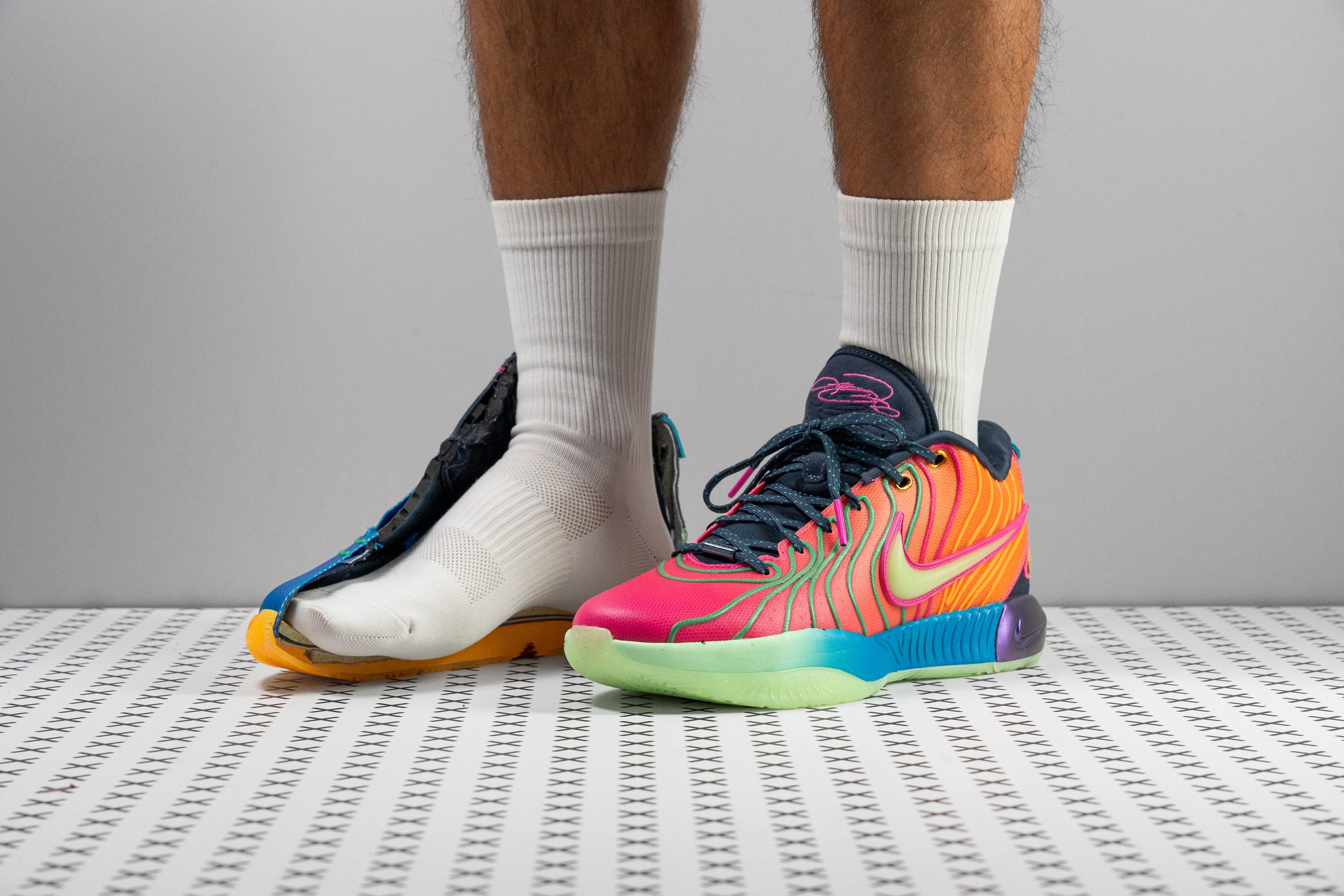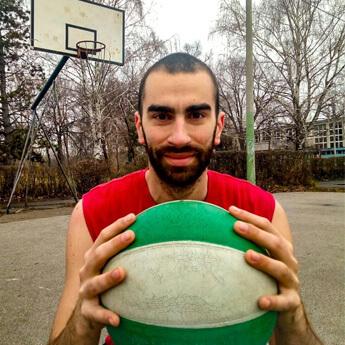Our verdict
- Top pick in best basketball shoes (2024)
- Top pick in best low top basketball shoes (2024)
Pros
- Wonderful performance overall
- Amazing cushioning technologies
- Excellent bounce and shock absorption
- Fantastic outsole grip
- High-quality materials
- Great stability and supportive design
- Good twist resistance
- Eye-catching style
Cons
- Not breathable
- Rough and long break-in period
- Pricey
Audience verdict
Comparison
The most similar basketball shoes compared
+ + Add a shoe | |||||
|---|---|---|---|---|---|
| Audience score | 86 Good! | 87 Great! | 86 Good! | 88 Great! | |
| Price | $210 | $140 | $210 | $140 | |
| Signature | LeBron James | Devin Booker | LeBron James | Trae Young | |
| Shock absorption | Moderate | Moderate | High | - | |
| Energy return | Moderate | Low | High | - | |
| Traction | High | Moderate | Moderate | - | |
| Top | Low | Low | Low | Low | |
| Ankle support | ✓ | ✓ | ✓ | ✓ | |
| Weight lab | 14.2 oz / 403g | 13.6 oz / 386g | 15.5 oz / 439g | 15 oz / 425g | |
| Lightweight | ✗ | ✓ | ✗ | ✗ | |
| Breathability | Moderate | Warm | Warm | Moderate | |
| Outsole durability | Good | Decent | Good | Good | |
| Drop lab | 4.2 mm | 7.0 mm | 7.7 mm | 8.9 mm | |
| Heel stack lab | 26.6 mm | 26.9 mm | 31.1 mm | 29.6 mm | |
| Forefoot | 22.4 mm | 19.9 mm | 23.4 mm | 20.7 mm | |
| Size | Slightly small | Slightly small | True to size | True to size | |
| Midsole softness | Balanced | Balanced | Soft | Balanced | |
| Stiffness | Stiff | Moderate | Moderate | Stiff | |
| Torsional rigidity | Stiff | Stiff | Stiff | Stiff | |
| Heel counter stiffness | Stiff | Stiff | Stiff | Moderate | |
| Width / fit | Wide | Medium | Wide | Medium | |
| Toebox width | Medium | Medium | Medium | Medium | |
| Midsole width - forefoot | Wide | Average | Average | Wide | |
| Midsole width - heel | Average | Narrow | Average | Very wide | |
| Heel padding durability | Decent | Good | Good | Decent | |
| Toebox durability | Good | Decent | Good | Decent | |
| Insole thickness | Average | Average | Very thick | Average | |
| Outsole hardness | Average | Average | - | Hard | |
| Outsole thickness | Average | Average | Average | Average | |
| Heel tab | Pull tab | Finger loop | None | Finger loop | |
| Ranking | #53 Bottom 39% | #28 Bottom 48% | #33 Bottom 38% | #25 Top 47% | |
| Popularity | #42 Top 48% | #12 Top 23% | #11 Top 21% | #42 Bottom 22% |
Who should buy
LeBron has bounced back with this wonderful hooper! Don't sleep on it if you're looking for:
- A model with incredibly good cushioning technologies (Zoom Turbo, Zoom Air).
- A pair that offers great stability and a supportive design.
- A hooper that adapts to different playstyles because of its overall wonderful performance.
- High-quality materials in a super stylish reimagined version.
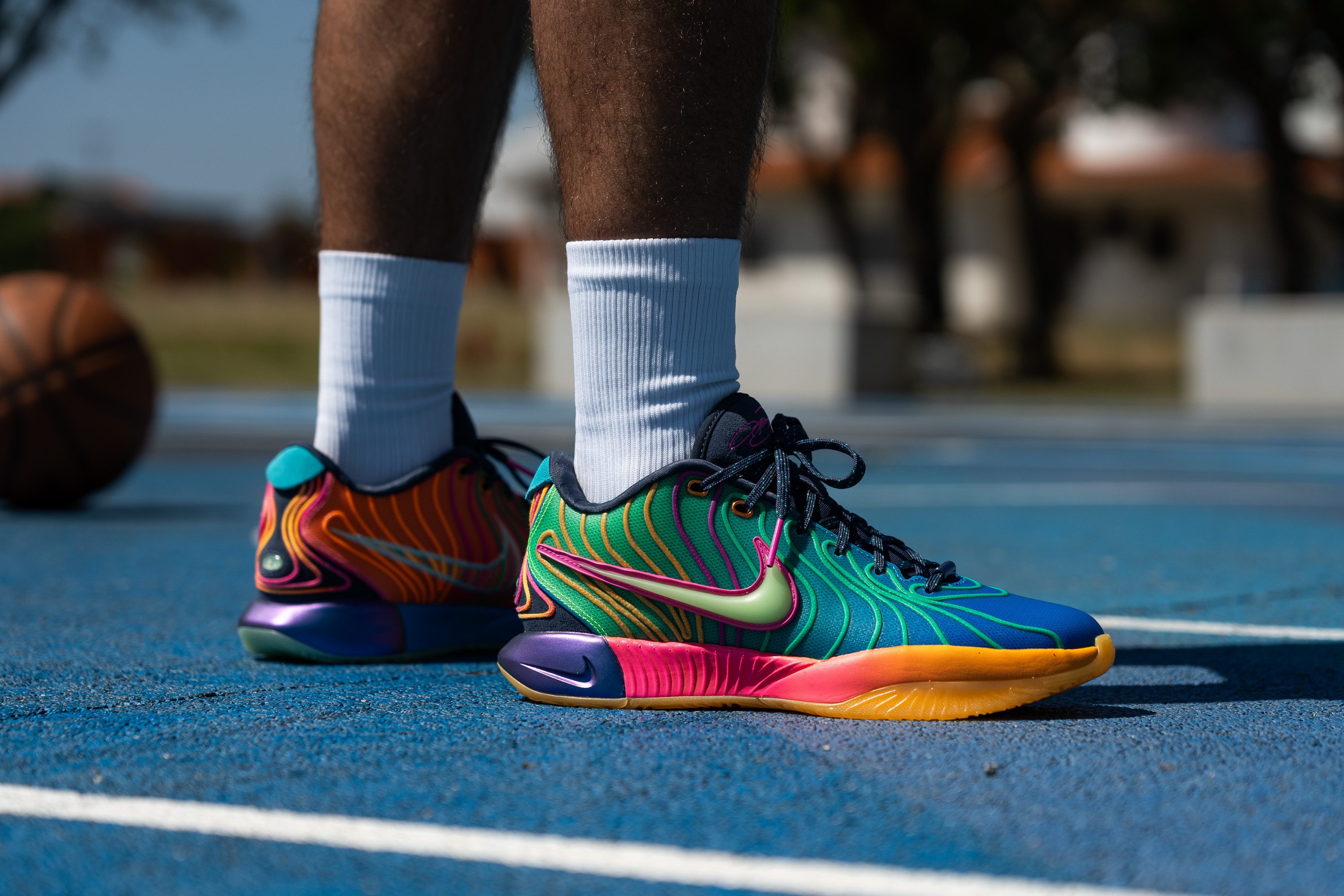
Who should not buy
We hope your feet are ready for what's coming. First of all, we loved this shoe from head to toe but... this shoe didn't love us that much at the beginning. Its break-in period is painful, and we ended up with blisters and sore Achilles for a while. It was worth it, though, as long as you can endure it, we can assure you this is an amazing pair. If you don't want to know anything about break-in periods (which is totally understandable), you should have a look at the Nike LeBron NXXT GEN, which also has high-quality materials but in a more comfy build.
If you wanna play streetball, we believe it's better to go for the Nike Cosmic Unity 3. Its hard and sturdy rubber outsole is unmatched when it comes to abrasion resistance.
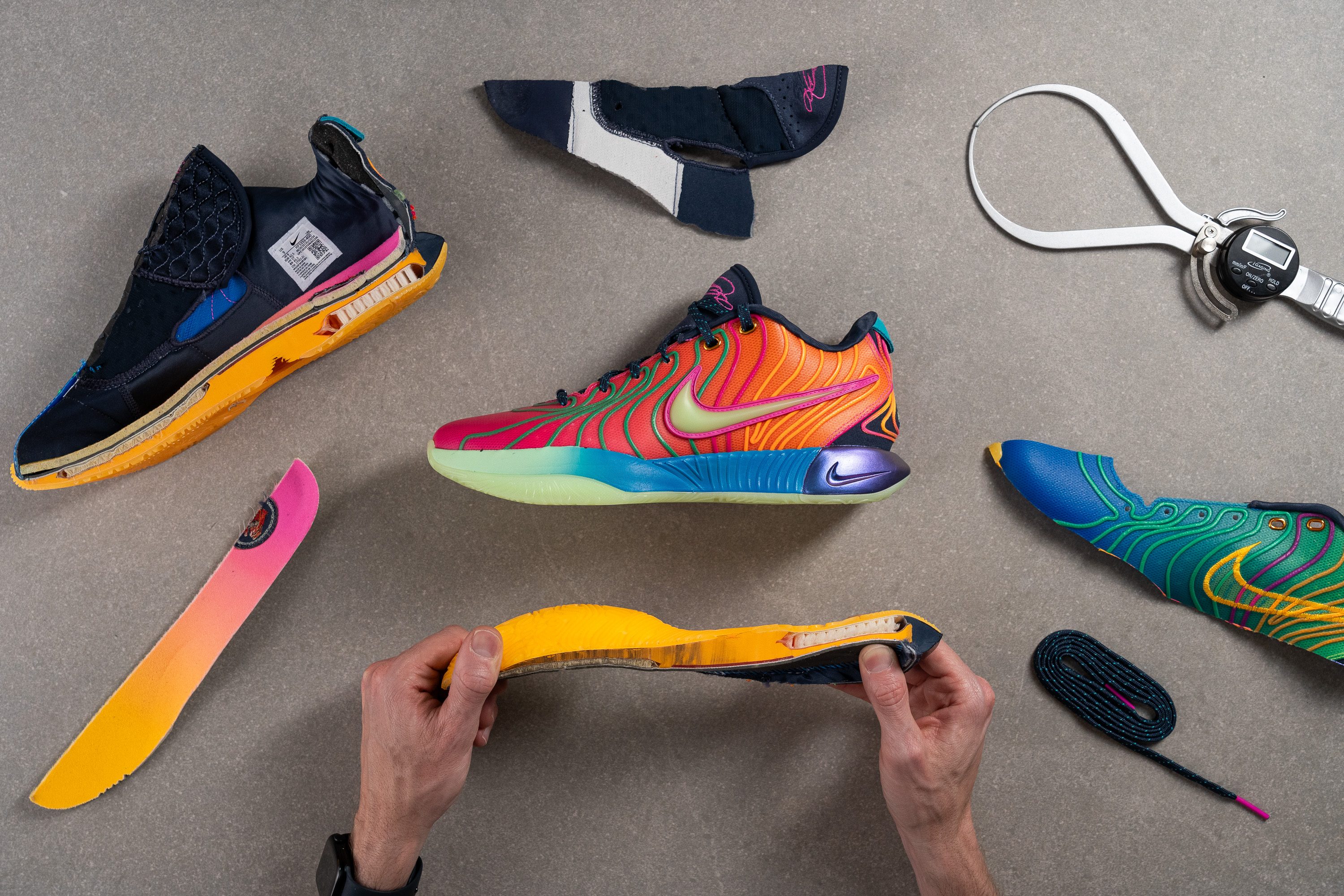
Cushioning
Shock absorption
Our machine recorded a solid shock absorption measurement of 102 SA in the shoe's heel, where a large Zoom Air unit is responsible for cushioned landings.
Meanwhile, the Zoom Turbo unit in the ball of the foot area helped to raise the shoe's forefoot reading even higher than average at 94 SA. This implies plenty of toe joint and ball of foot protection for those intense games that keep you on your toes until the last minute!
That excellent impact protection in a lower-stack platform makes the LeBron 21 a great option for versatile and aggressive players like The King himself. These athletes rely on balanced platforms that offer great cushioning without disconnecting them from the court.
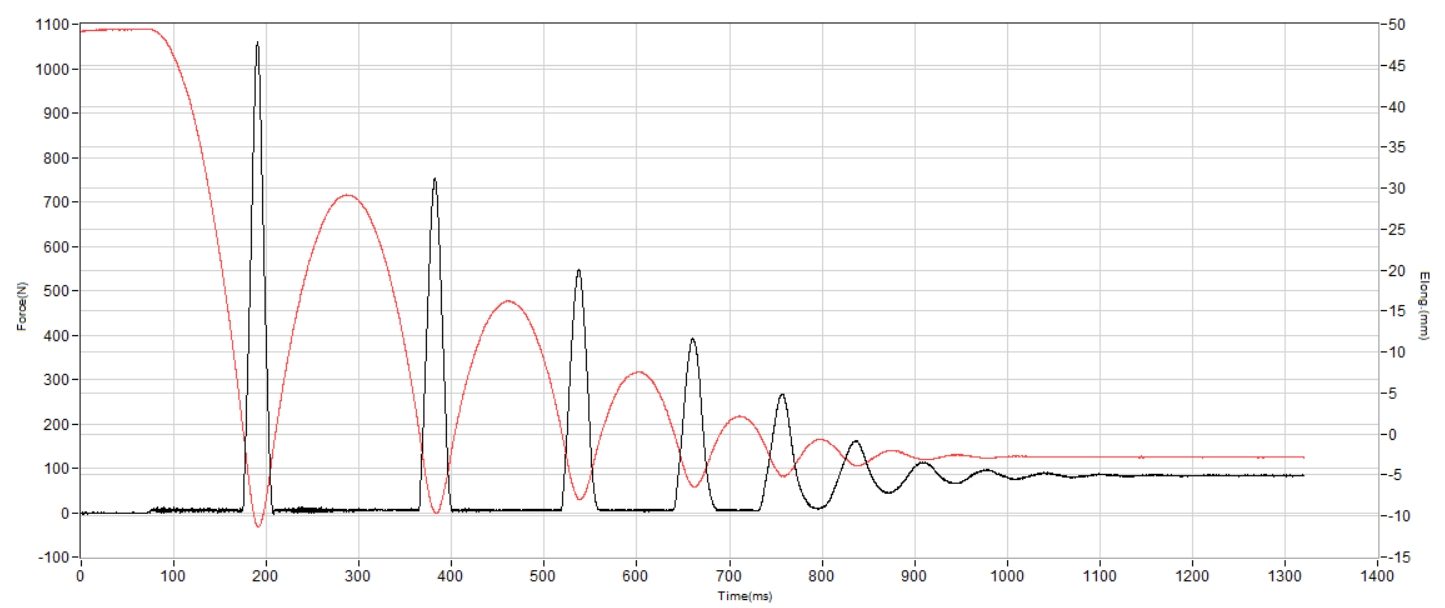
| LeBron 21 | 102 SA |
| Average | 103 SA |
Energy return
Packed with Nike's top-tier Zoom units, Cushlon foam, and a top-loaded shank, it is no surprise that the LeBron 21 exhibited above-average energy return.
It is a springy and dynamic shoe with a 65.7% rebound in the heel and a 63.9% one in the forefoot. These even results reflect the LeBron 21's energetic yet balanced ride.
| LeBron 21 | 63.9% |
| Average | 62.1% |
Heel stack
At 26.6 mm, this shoe's heel stack is lower than average. We believe this just because of our caliper said so, as the feeling on our foot was not that one of a low stack regarding cushioning!
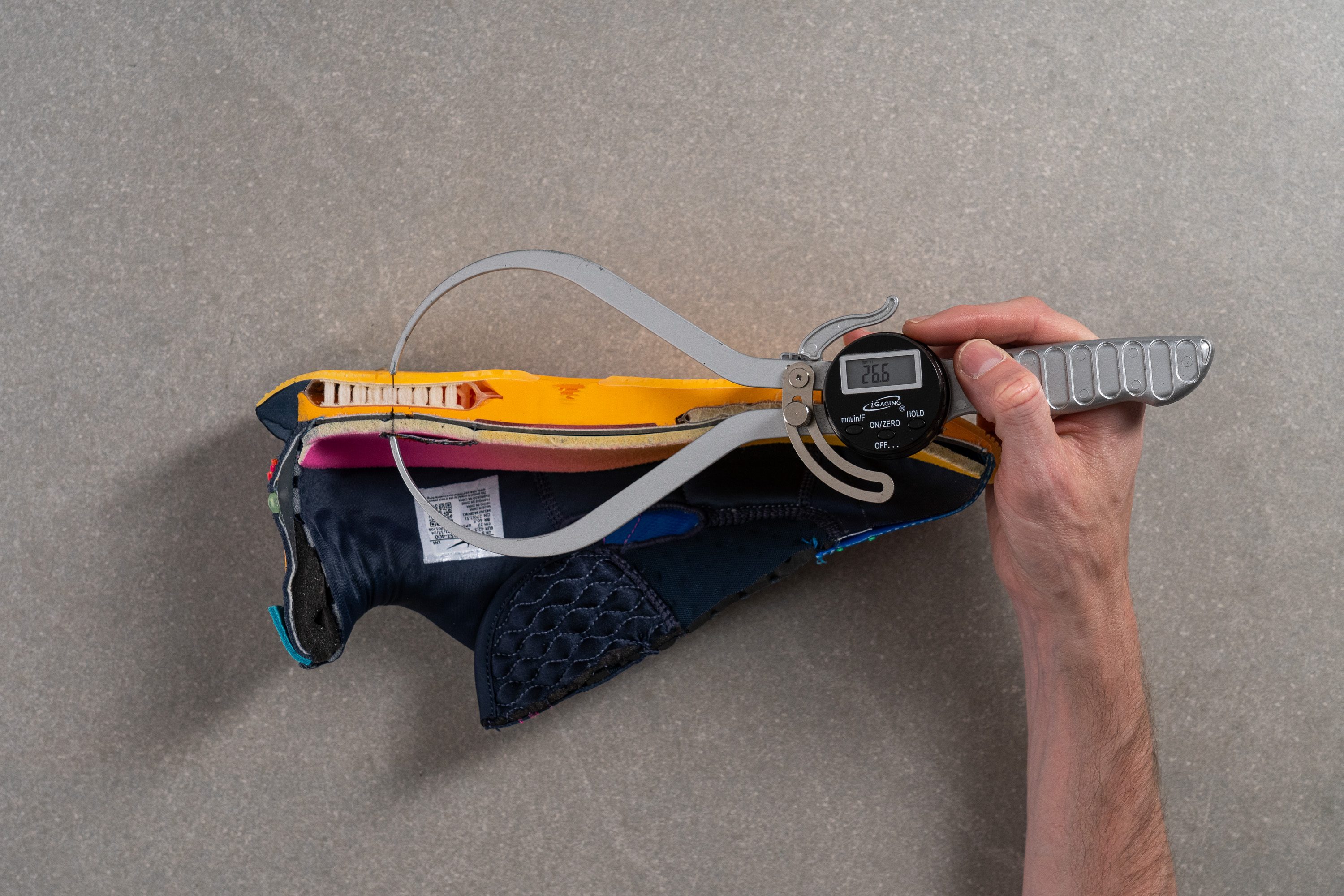
| LeBron 21 | 26.6 mm |
| Average | 28.8 mm |
Forefoot stack
At 22.4 mm, the forefoot stack of these LeBrons is pretty close to the average.
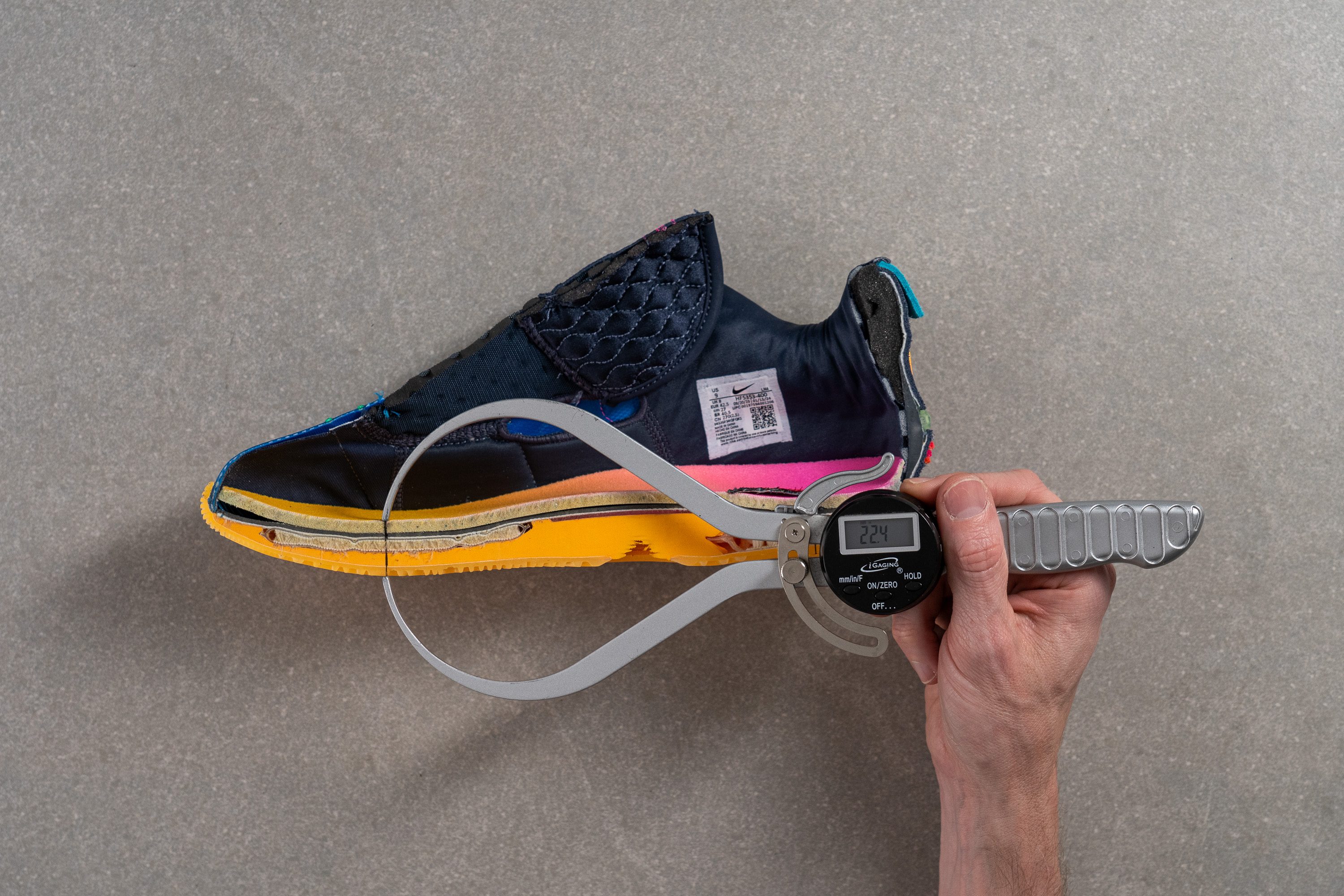
| LeBron 21 | 22.4 mm |
| Average | 21.4 mm |
Drop
At 4.2 mm, this shoe's drop is significantly lower than average and feels a lot more like a Kobe shoe.
A low-drop offset implies that the foot sits almost parallel to the court as opposed to having a raised heel, as in the 7-8 mm drop shoes. This setup promotes better ground feedback, stability, and faster reaction.
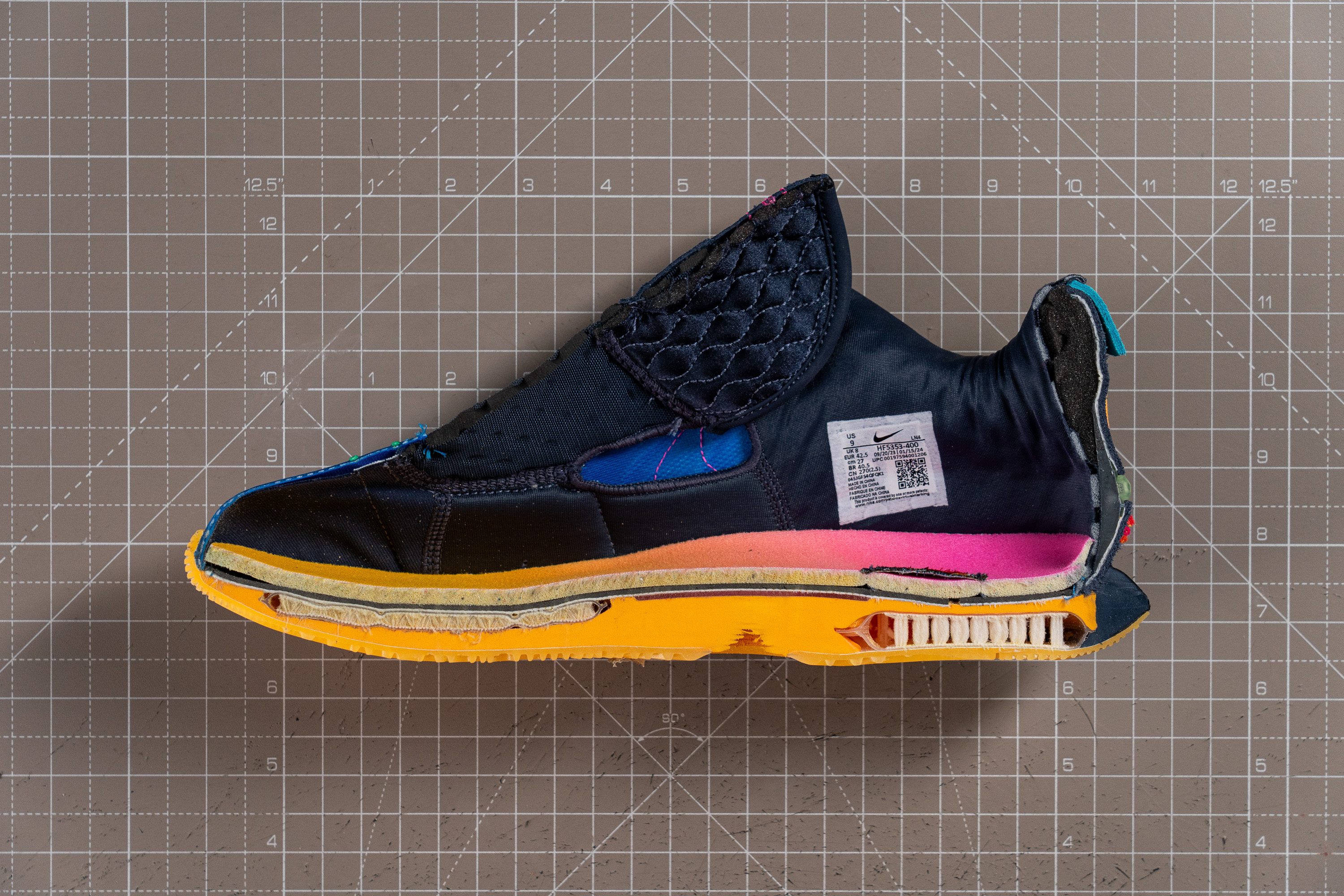
| LeBron 21 | 4.2 mm |
| Average | 7.4 mm |
Midsole softness
To measure the softness of a shoe's midsole accurately, we need to cut it in half. Then, when we can access this piece nicely, we press our durometer against it and wait for a result.
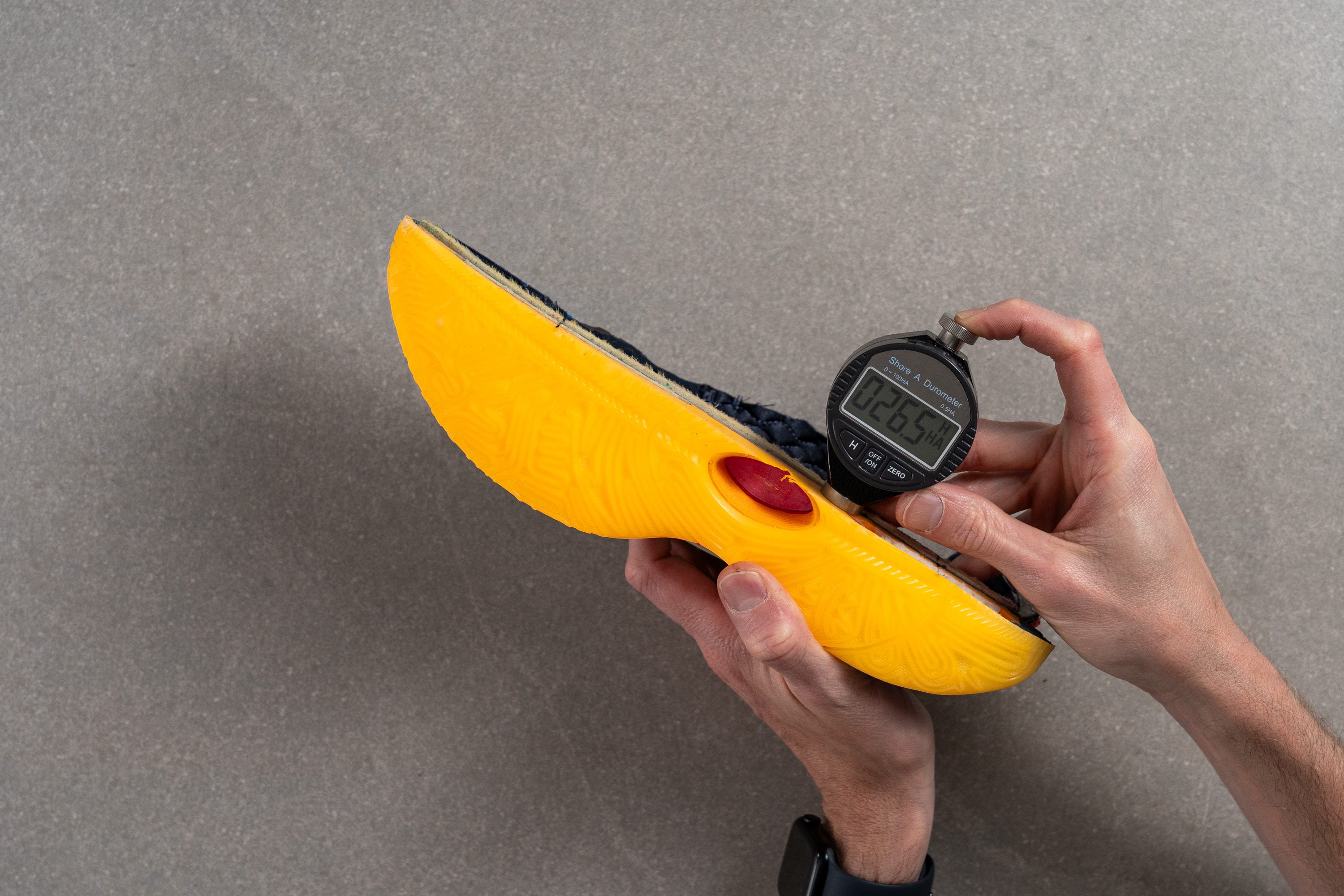
At 26.5 HA, the LeBron 21's Cushlon foam turned out to be of average softness.
| LeBron 21 | 26.5 HA |
| Average | 24.3 HA |
Size and fit
Size
Nike LeBron 21 fits slightly small (301 votes).
Internal length
| LeBron 21 | 271.0 mm |
| Average | 271.7 mm |
Width / Fit
When we measured the toebox width at the widest part, our caliper returned 102.7 mm.
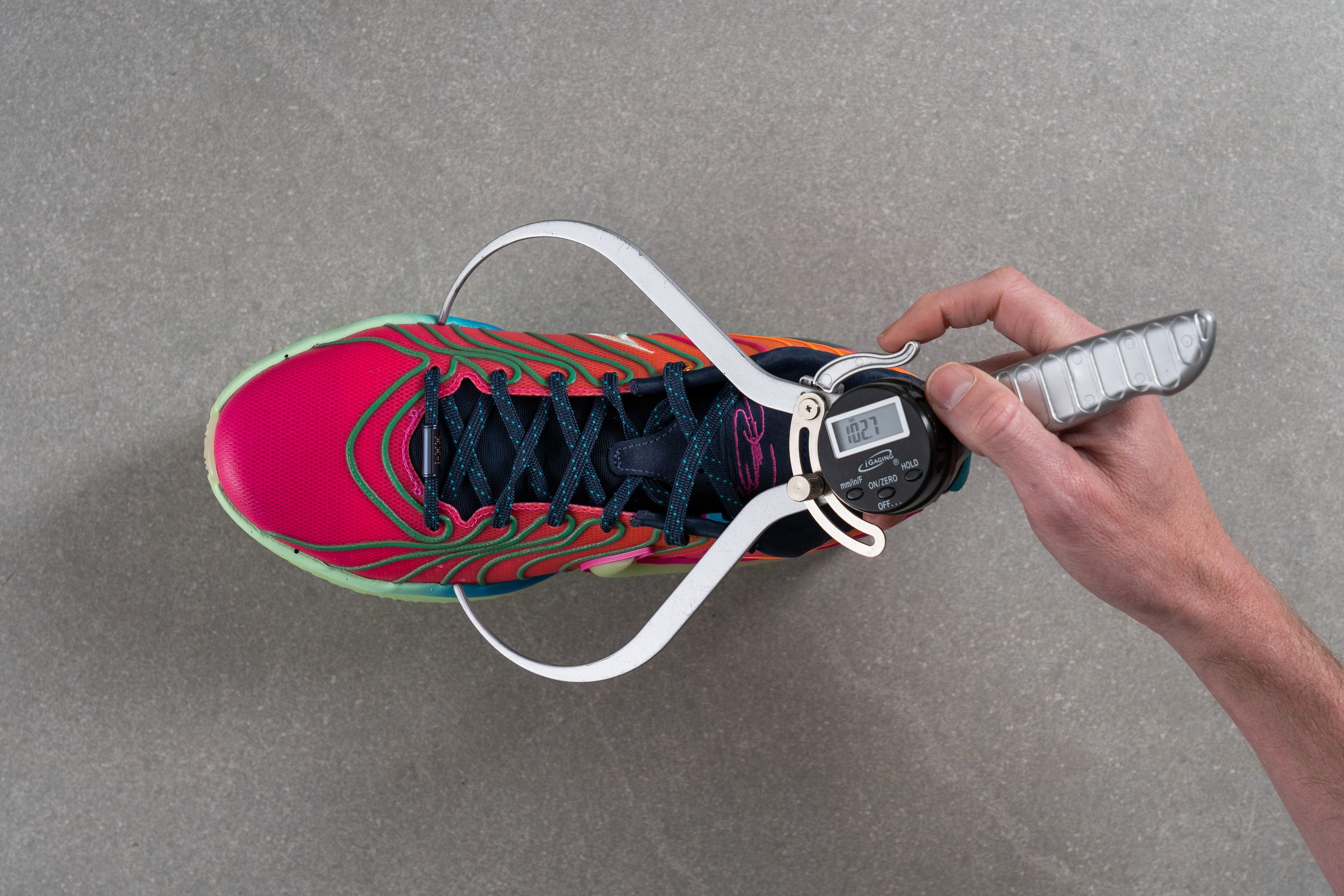
It's an average score, and our standard width feet were pretty happy wit it. Nevertheless, we can't recommend this model to wide-feet hoopers, as it might be too snug for their bigger feet.
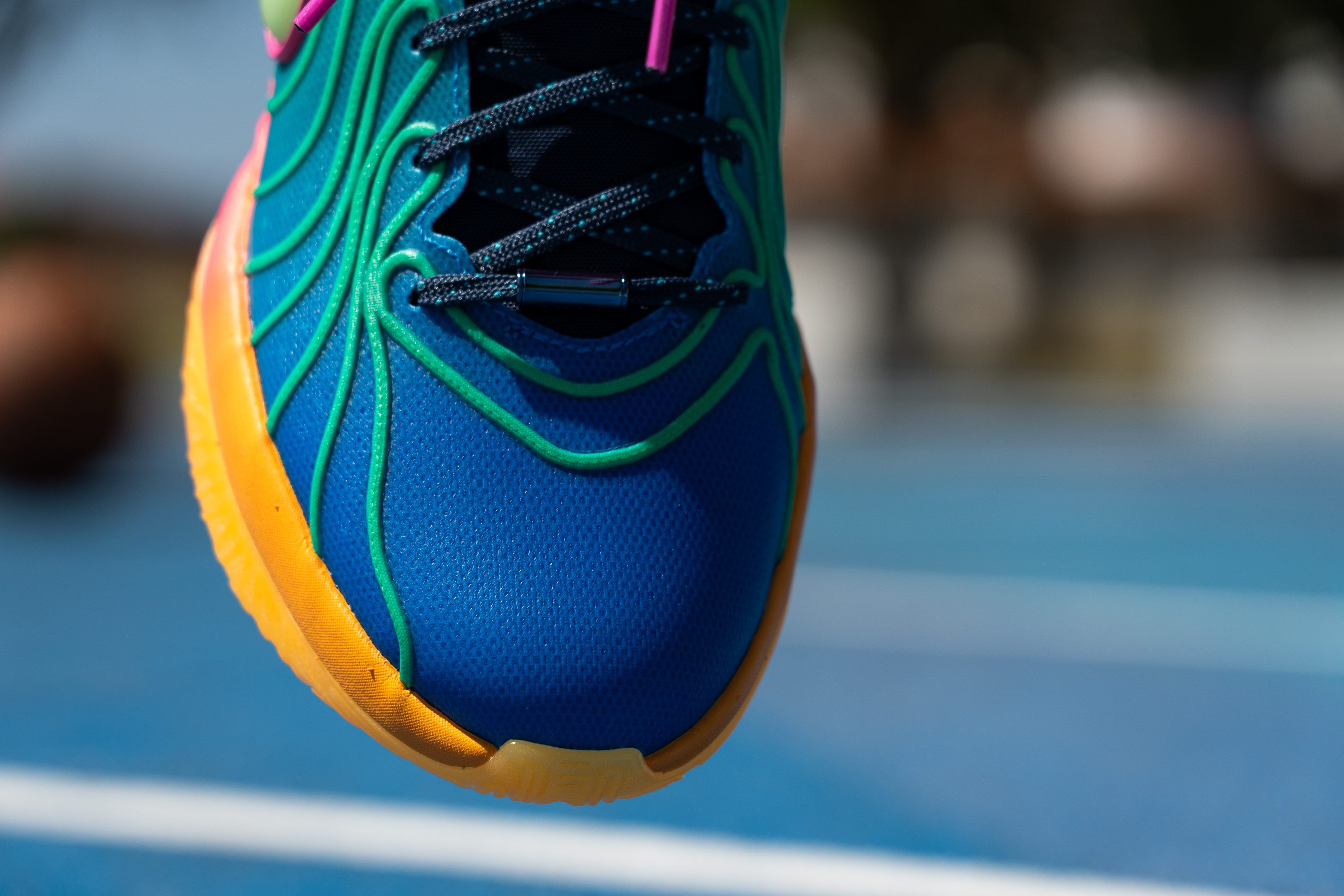
We absolutely loved the dual colour of this model. We think it brings a new and original style to an already iconic pair, and the fact that the details of both shoes are on the same tones is just so aesthetically pleasing!
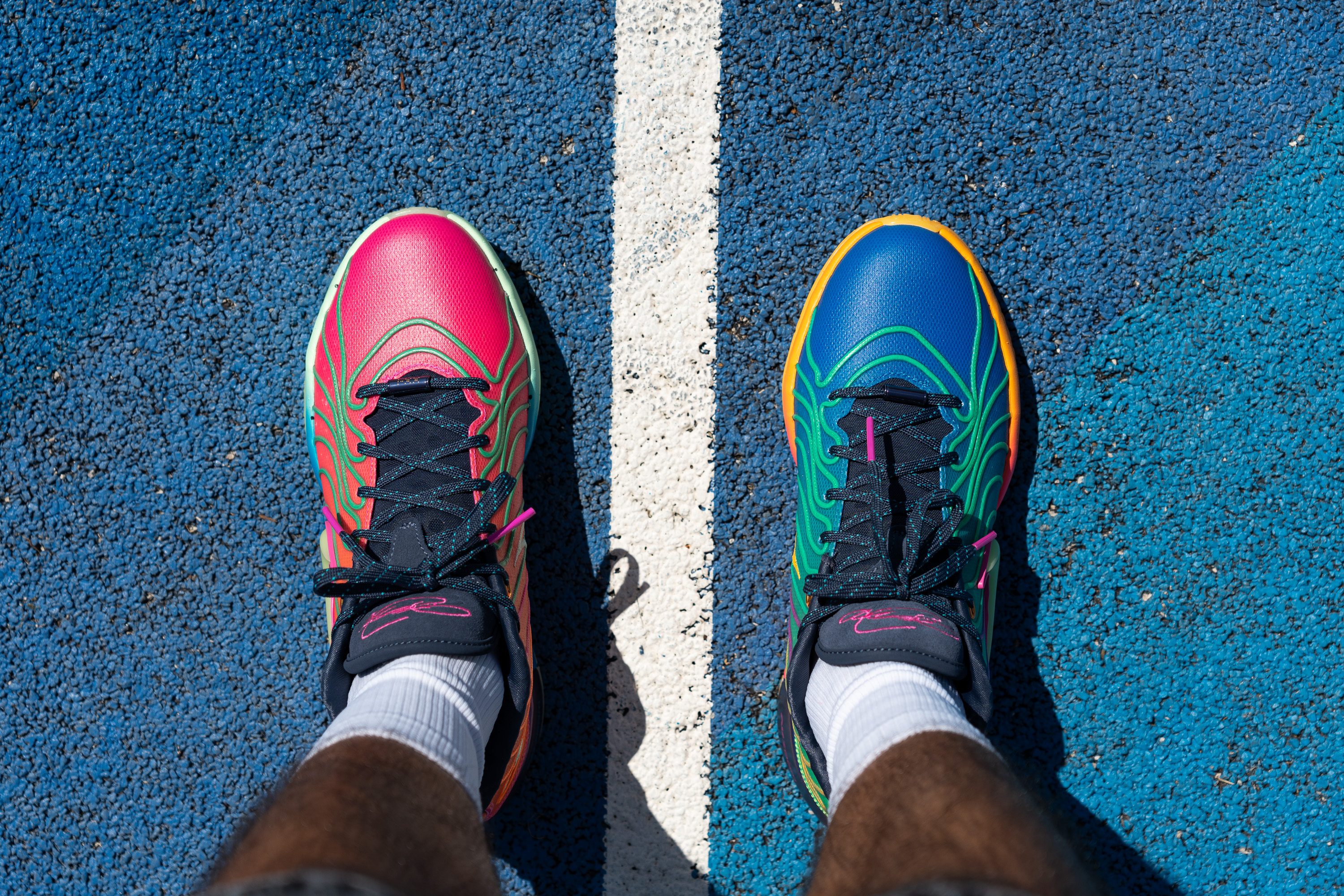
This test follows an older methodology, which is why you don't see recently tested shoes in the chart. Results from different methodologies can not be compared.
| LeBron 21 | 102.7 mm |
| Average | 101.6 mm |
Toebox width
At 75.7 mm, our caliper agrees this model tappers quite a lot towards the tip.
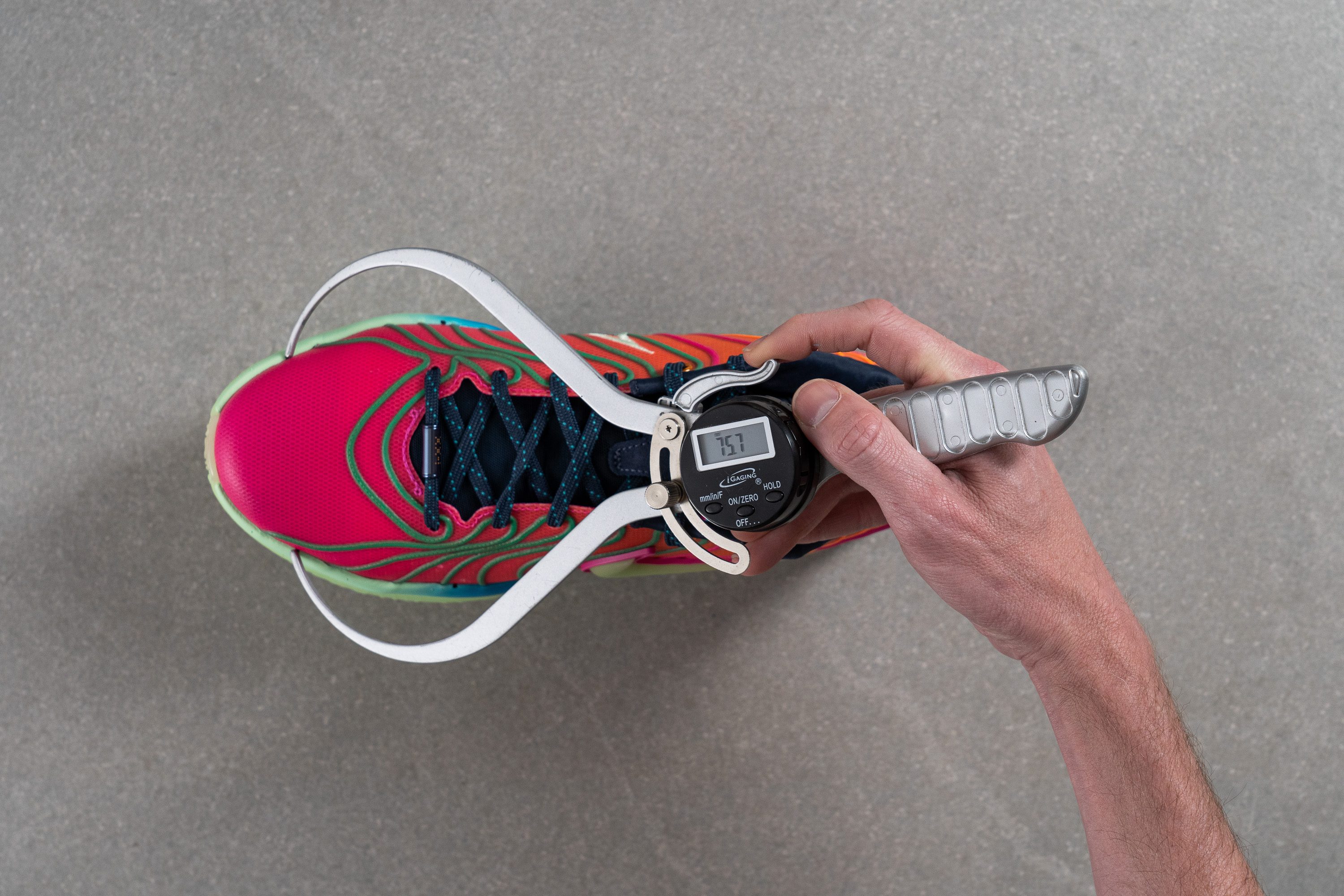
That's why we believe wide-foot hoopaholics won't find this pair comfortable. Their toes might feel cramped, but this isn't something we didn't expect from a Nike shoe, honestly.
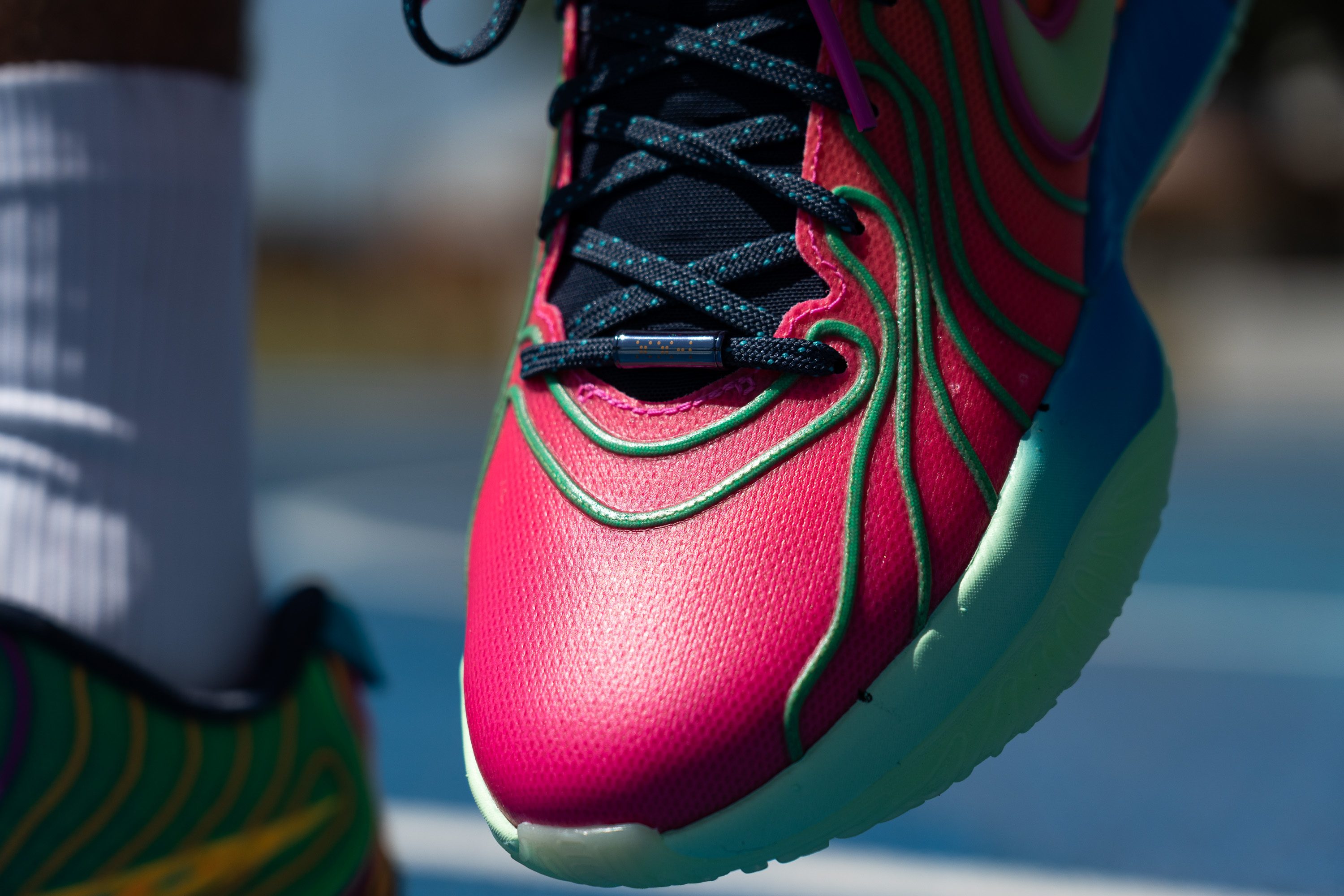
If you're looking for an elite model that adapts to wide feet and you don't mind changing brands, you might enjoy the Adidas Harden Vol 7.
This test follows an older methodology, which is why you don't see recently tested shoes in the chart. Results from different methodologies can not be compared.
| LeBron 21 | 75.7 mm |
| Average | 76.9 mm |
Traction / Grip
Forefoot traction
A shoe that carries the basketball royalty's name cannot afford to have poor traction. And we are here to confirm that the Lebron 21 lives up to the hype!
The shoe returned a very high coefficient of friction (0.88) in our grip test which involved sliding its forefoot against a professional court surface with an applied force of 500N. On foot, this means an amazingly tacky bite in all directions and a minimal need for wiping on dusty courts.
And just when you think that it can't get any better, Nike releases the LeBron 22 with a whopping 0.95 coefficient of friction!
| LeBron 21 | 0.88 |
| Average | 0.75 |
Outsole design
The Nike LeBron 21 uses translucent rubber with very thin tread lines for the outsole. And because of the latter, we can't recommend this shoe for outdoor use - the delicate nature of its treading is just not ready for the rigors of the blacktop.
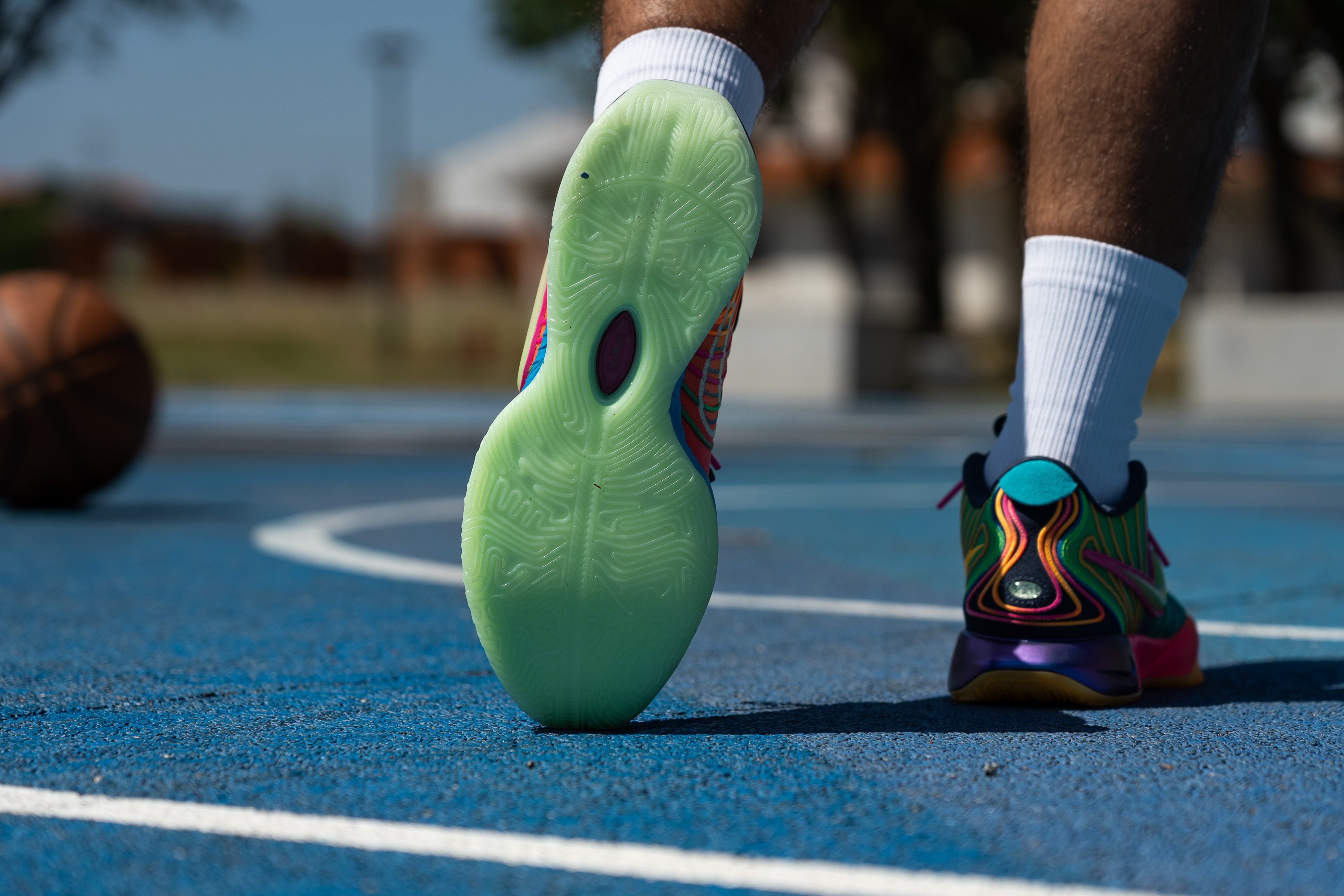
Flexibility / Stiffness
The LeBron 21 is a stiffer shoe that requires an above-average force of 24.4N to bend by 30 degrees.
It is an optimal setup for bigs and players with a power-based game, as the added stiffness makes the shoe more stable and supportive. However, it can feel restrictive and unyielding for the more agile players and requires a break-in period to feel at home on the foot.
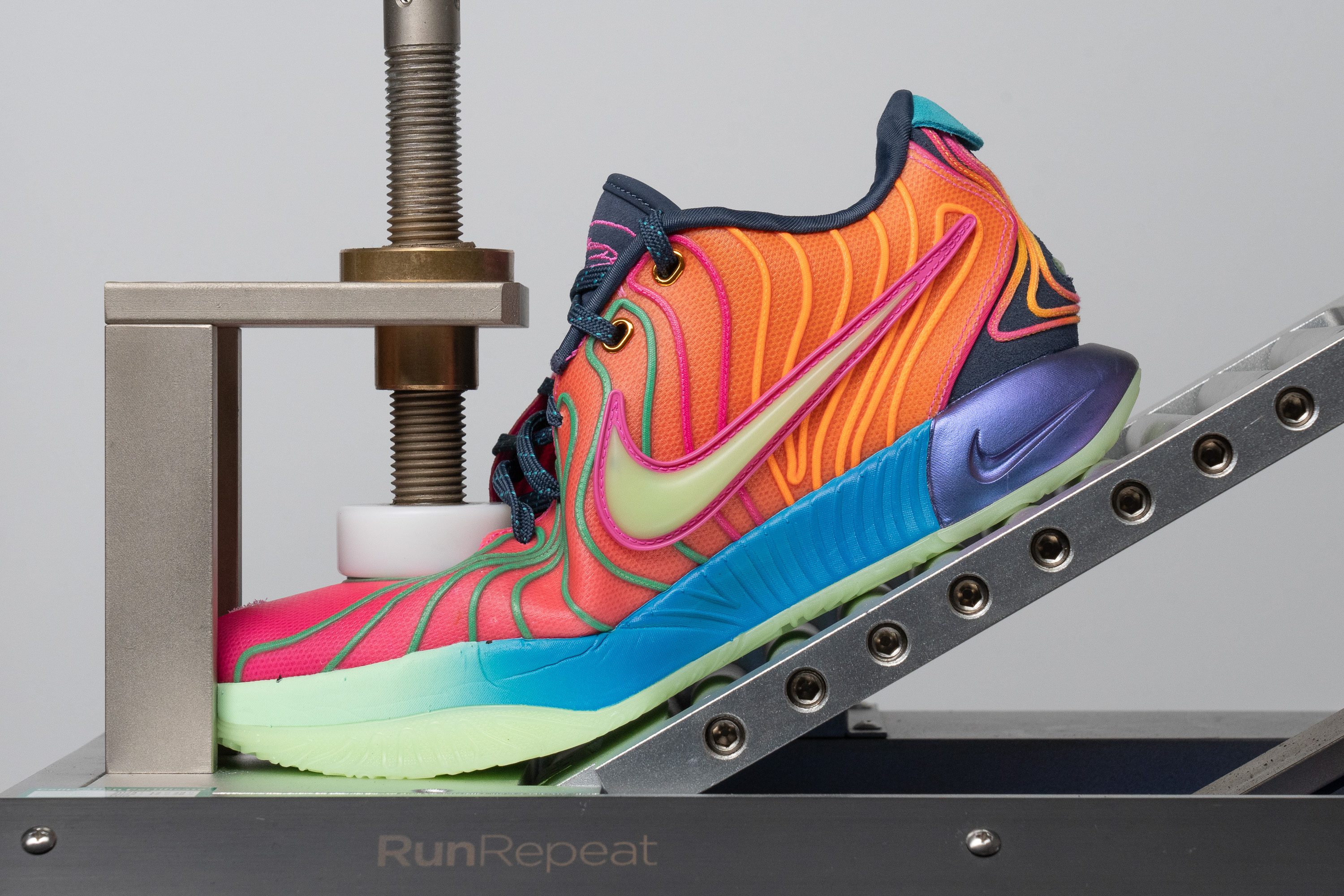
| LeBron 21 | 24.4N |
| Average | 20.5N |
Weight
Tougher materials, a thicker outsole, loads of padding... of course this is gonna have an effect on the weight!
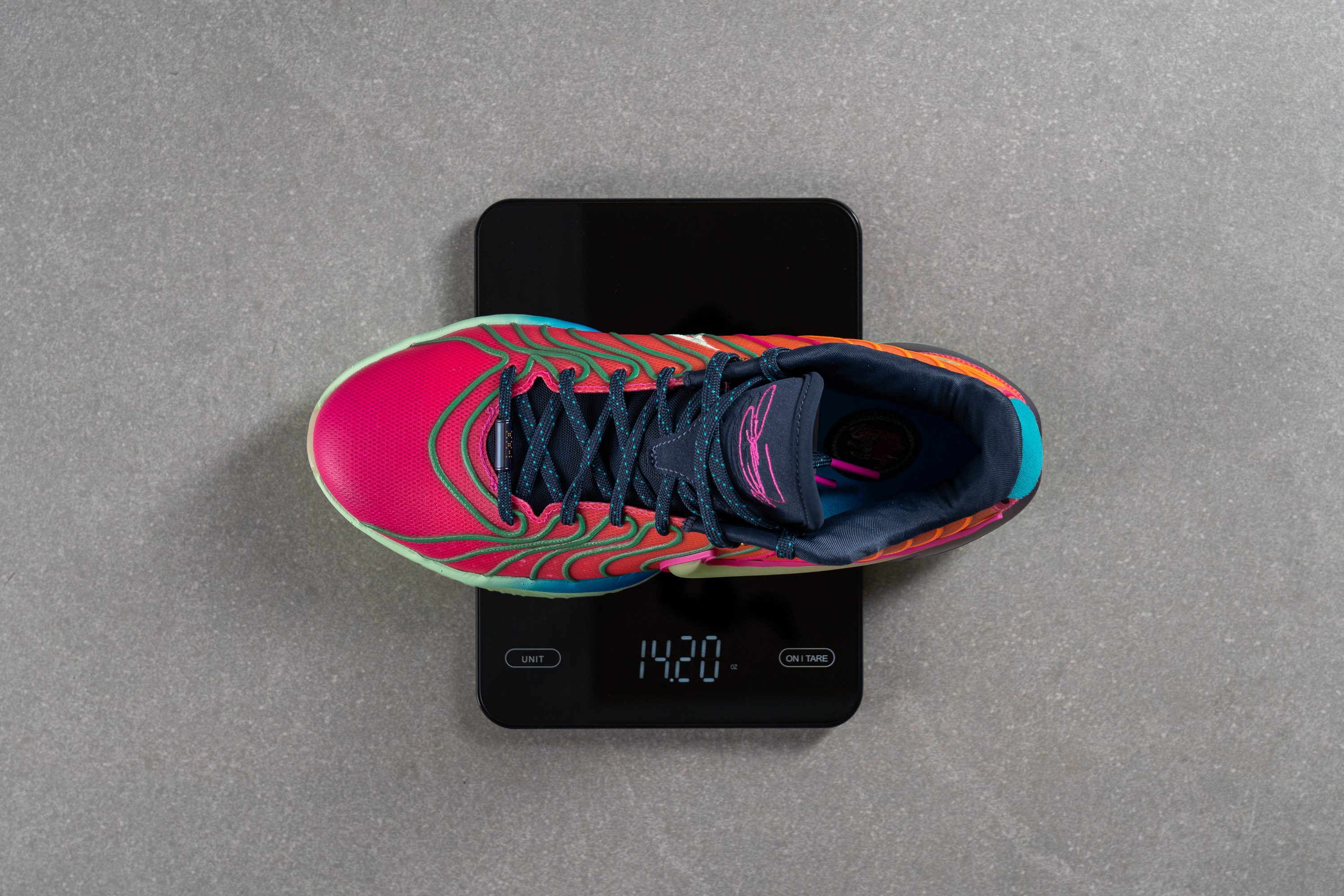
At 14.2 oz/403.0g, this shoe is lighter than the previous iteration, and the materials felt premium on our feet. LeBron is a power forward, and if you've ever seen him on the court, you'll know he's a big guy. He doesn't need to be as fast as a guard in his moves, so his shoe's design didn't really focus on that. Nevertheless, the model we're reviewing is the NEW LeBron 21, which is an updated and lighter version of the original.
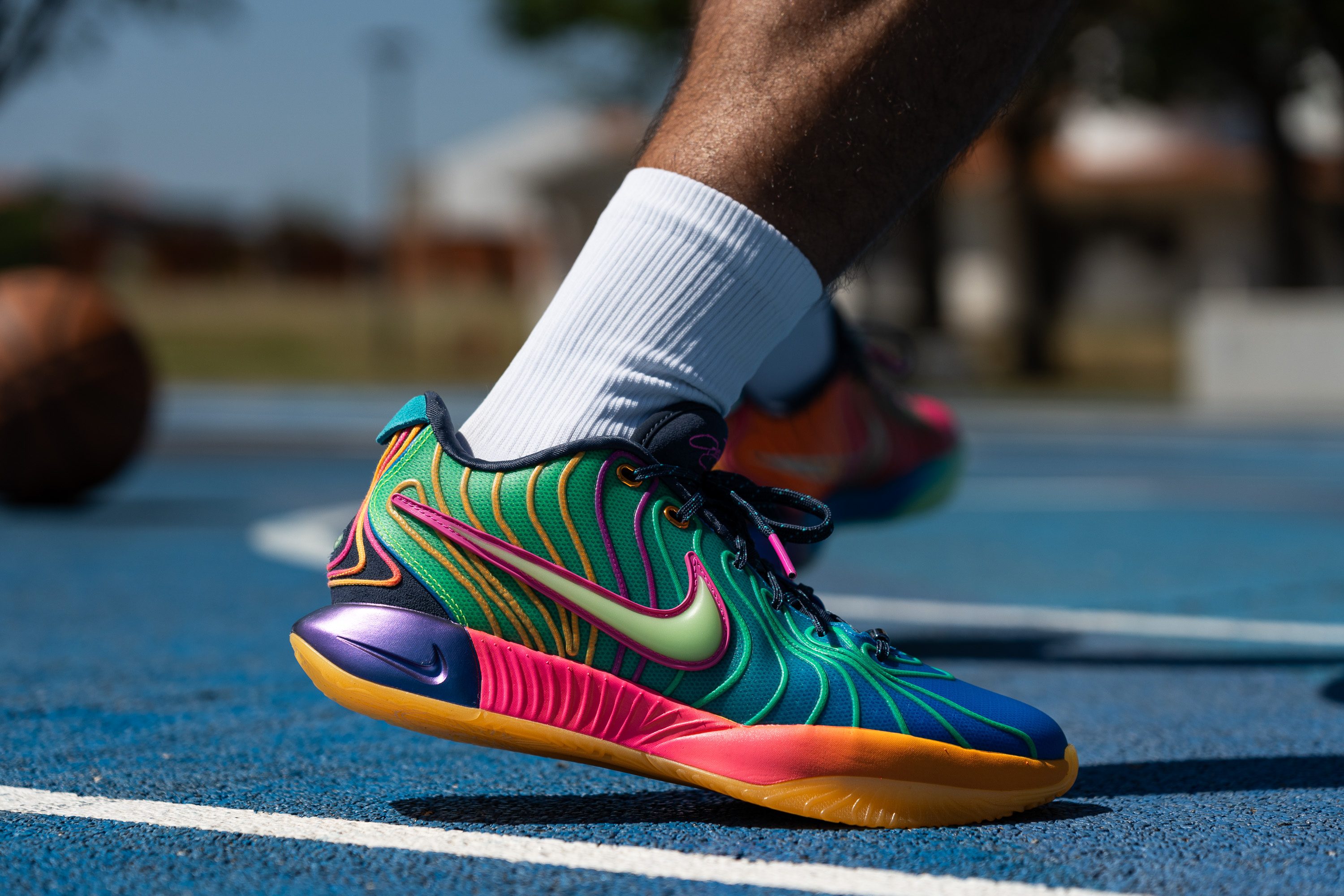
With that being said, its weight didn't stop us from making quick fakes, crossover steps, or dribbles. It was nice for our pick-and-rolls, too! It felt nice on our feet, and we didn't mind some extra oz if that meant we got to use this shoe longer.
| LeBron 21 | 14.2 oz (403g) |
| Average | 13.8 oz (391g) |
Breathability
Just by looking at these LeBrons, we knew they'd prioritise durability. So... what about breathability? Well, let's see!
It looks like we were totally right. Neither LeBron's nor Shaq's shoes would be able to earn a living being yoga instructors. The Reebok Shaq Attaq got a sad 1/5 in our breathability test, and the LB 21? Uh-oh... we're afraid it got the exact same punctuation! Another disappointing 1/5.
As we can see in our light test, only the tongue has some holes, but that was not enough to let our feet breathe during our wear tests.
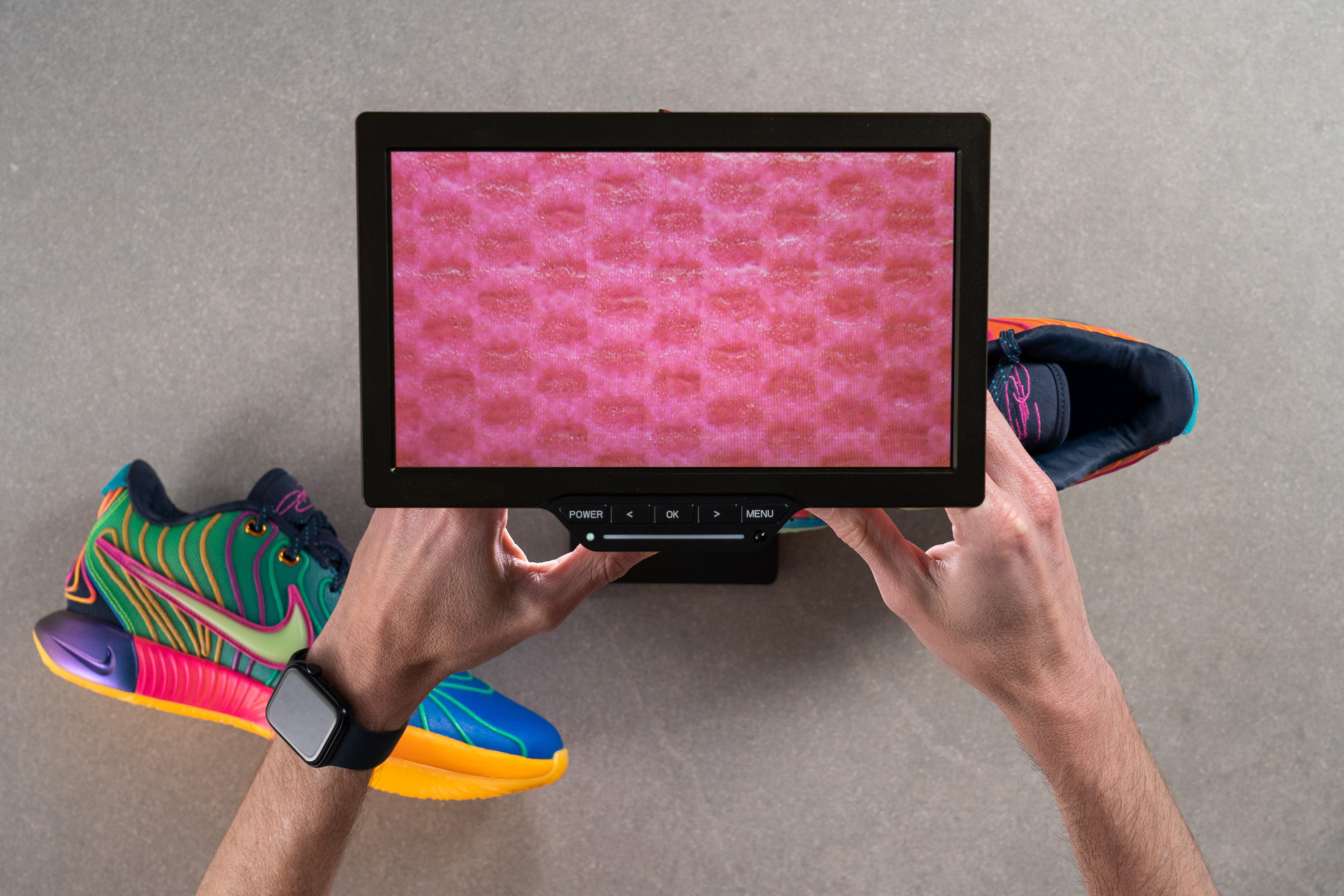
Our microscope confirmed it, look at the material! Even though you might see some round details, those are definitely not pores. This model is built to last, and its upper agrees!
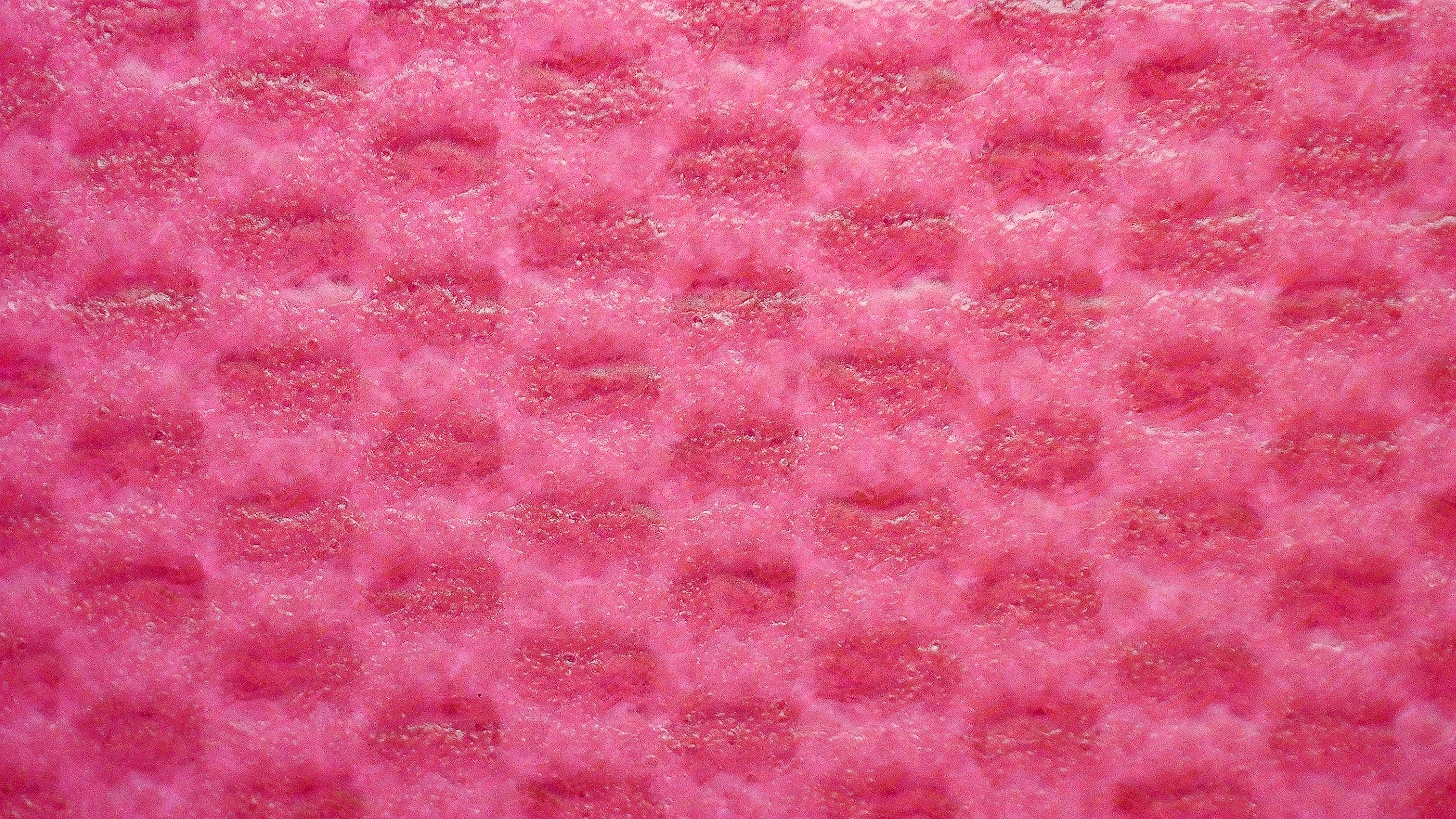
Nothing to be found in the close-up either. The material is solid, no pores at all!
| LeBron 21 | 3 |
| Average | 2.5 |
Stability
Lateral stability test
Following the general features of this model, we definitely expected it to be quite stable. And not only because of that, but also because we're talking about a pair of LeBron shoes after all! The King needs some stability for his crazy plays, and we couldn't wait to see what our feet had to say about this.
As expected, we felt surefooted and well-supported. Our ankles didn't wobble, which is something we really appreciate when we play. Why? Well, because if we feel unstable in our new hoopers, we don't have that much confidence when we're trying to play. Doesn't that happen to you too?
Nevertheless, this model made sure that didn't happen. Our overall experience regarding stability was pretty nice, as we felt safe and sound during our playtests.
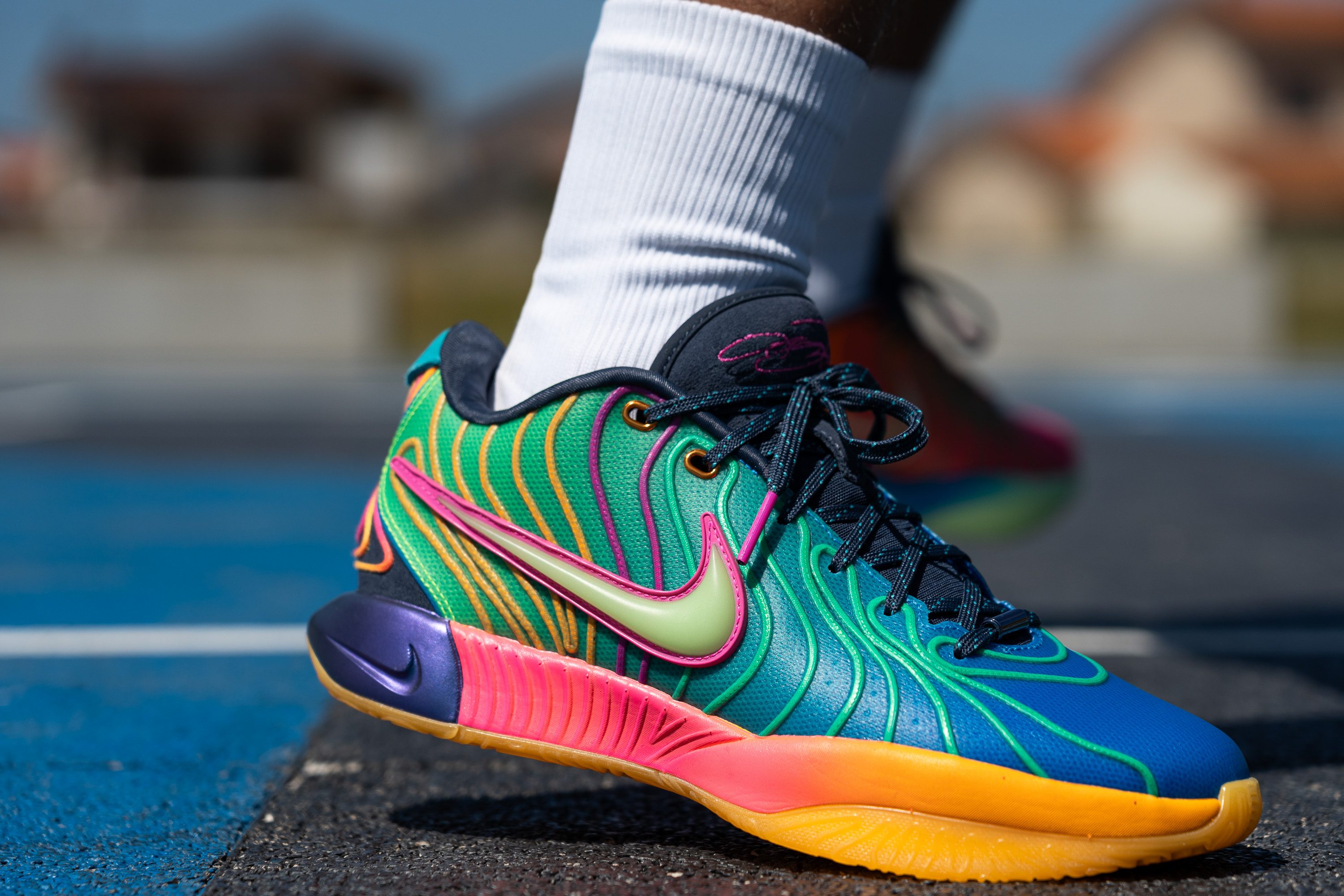
Torsional rigidity
Great stability comes with... great torsional rigidity.
We tried our best to bend the shoe, but it was pretty hard for our thumbs! You can see it in the video, we're clearly struggling. That's why we gave this model a well-deserved 5/5 in our torsional rigidity test, what a toughie!
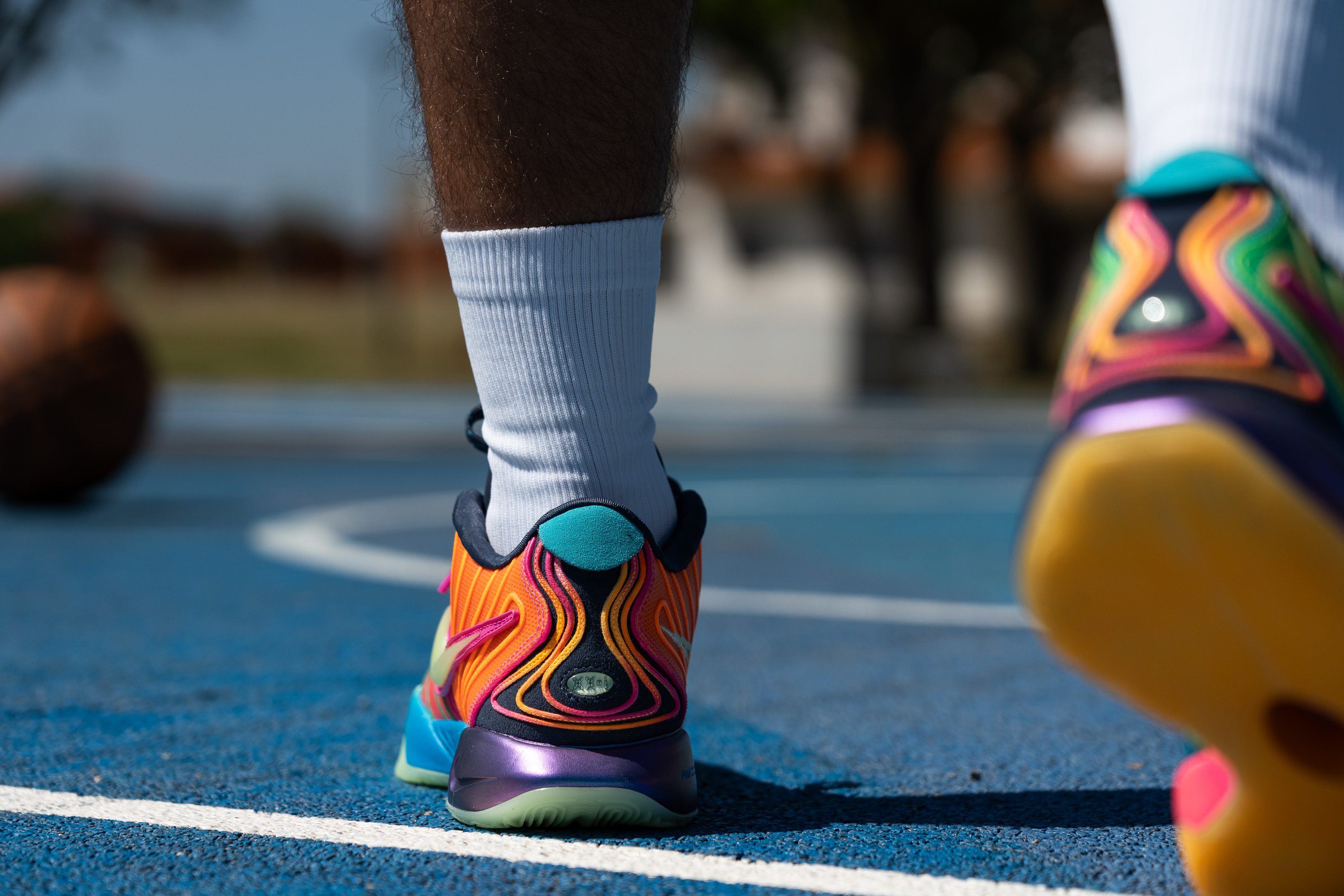
The only bad thing that comes with a high torsional rigidity is... a break-in period. And let us tell you, this shoe's break-in period? Definitely a killer, we ended up with blisters!
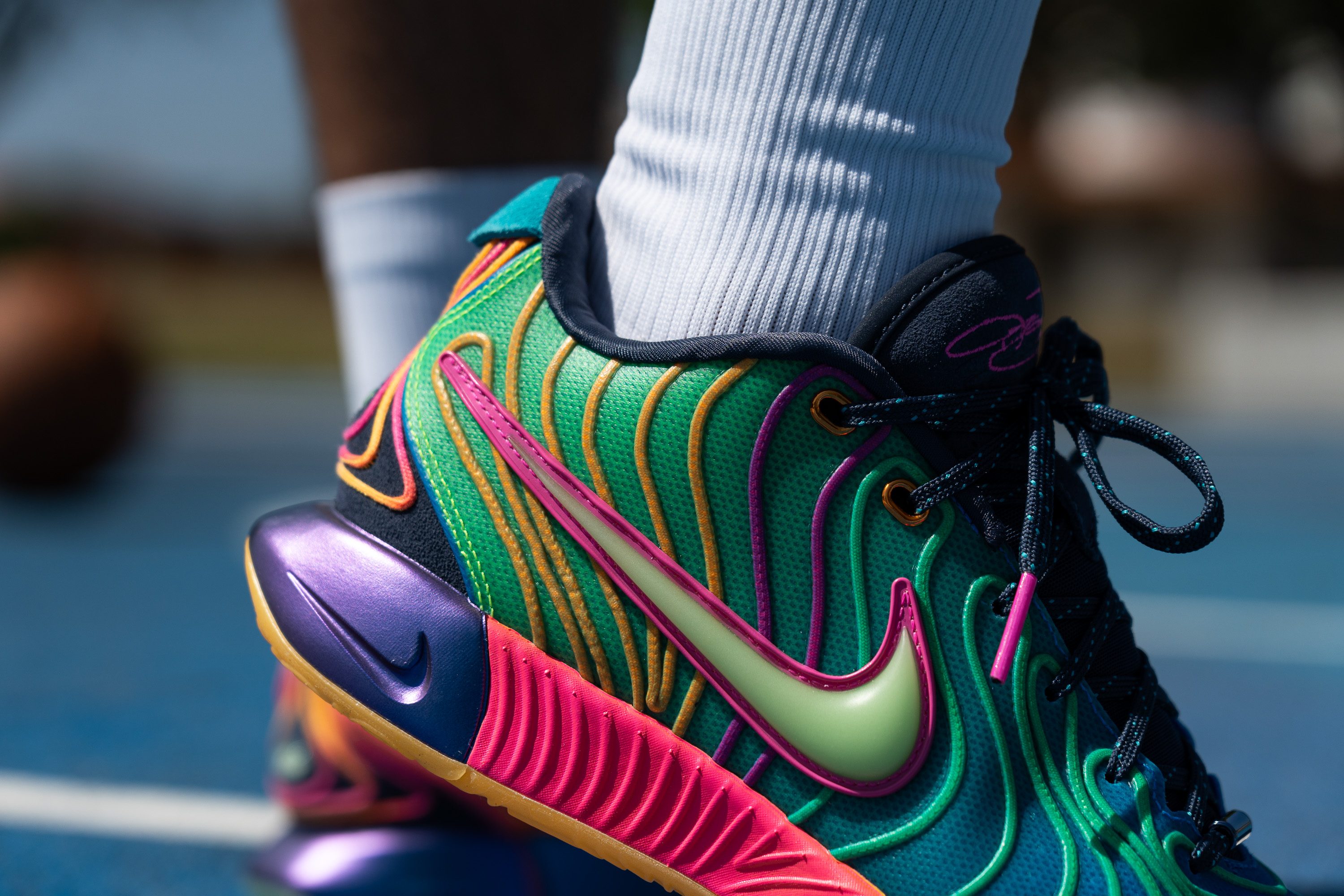
Still, we'd say this is pretty much the only big con we have for this model. The shoe itself is amazing!
| LeBron 21 | 5 |
| Average | 4.5 |
Heel counter stiffness
Now let's talk a little bit more about those blisters, shall we?
Just look at how incredibly stiff this LeBron's heel counter is. Oh, my! It doesn't even bend a little bit when we press our thumb against it.
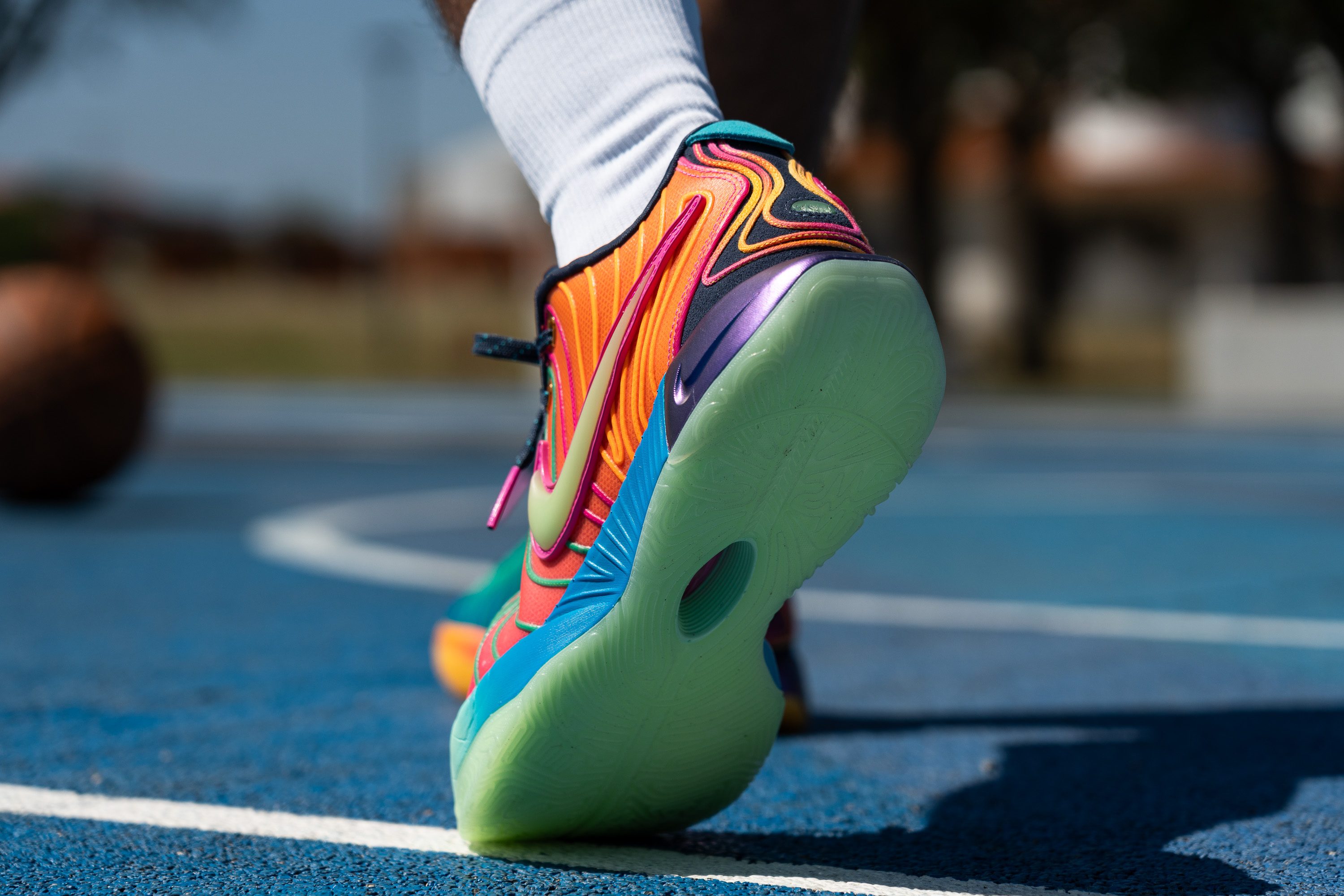
This sure meant some incredibly good lockdown feel, but it also came with a downside: heel rubs. It really hurt our skin, and we ended up with some painful blisters at the end of the day. This model is definitely full of power, but you gotta tame it first!
| LeBron 21 | 5 |
| Average | 3.8 |
Midsole width - forefoot
A wide platform is a must when we talk about stability, and big players like LeBron (in every sense of the word, though) definitely need it!
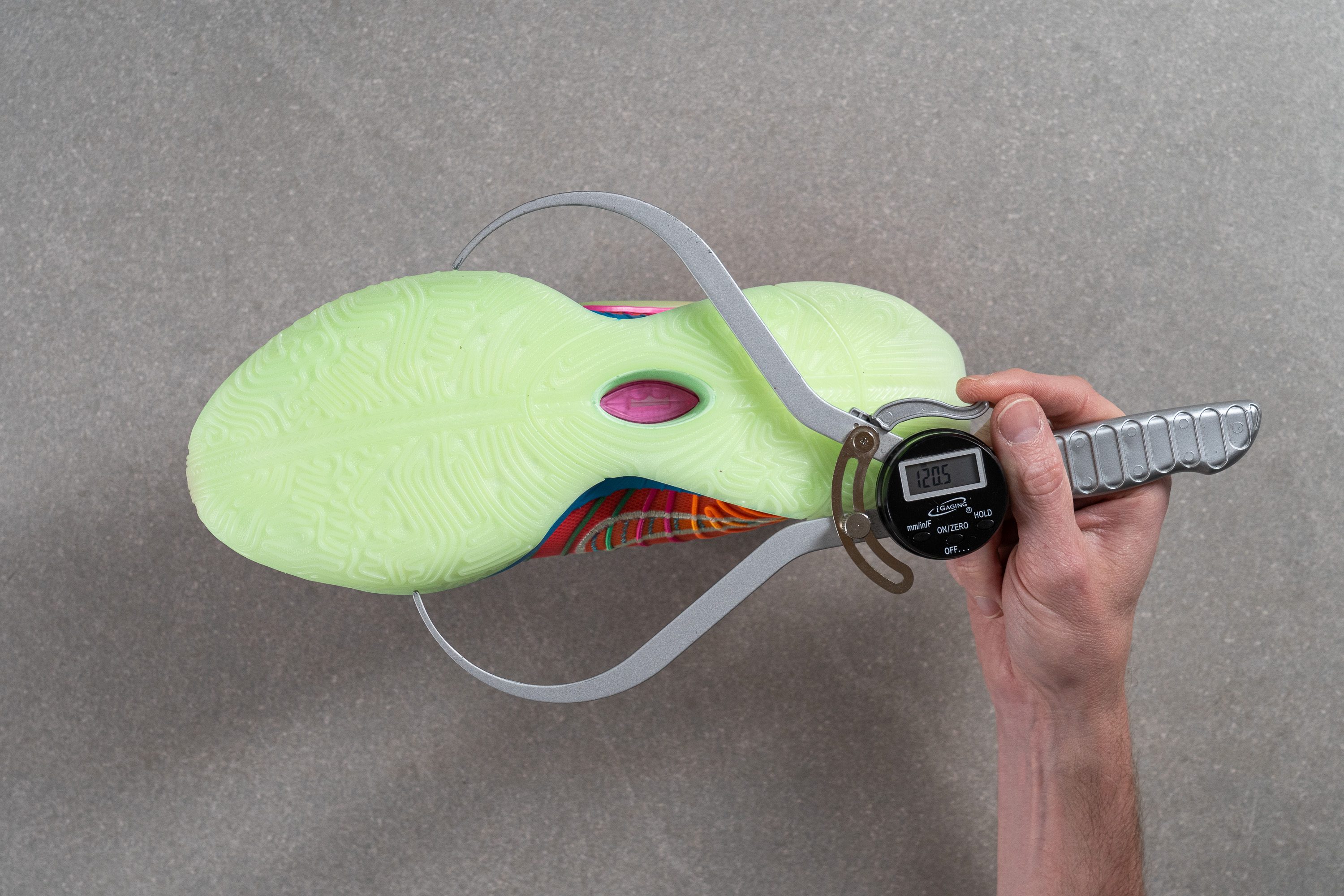
At 120.5 mm, this shoe's midsole width in the forefoot is far bigger than average. We wanted to jump in the lab because of the happiness this caliper reading made us feel. In our games, this translated into us being able to land safely. We could push for any rebound, and we were not taken aback even if in the jump ball we were facing a bigger person.
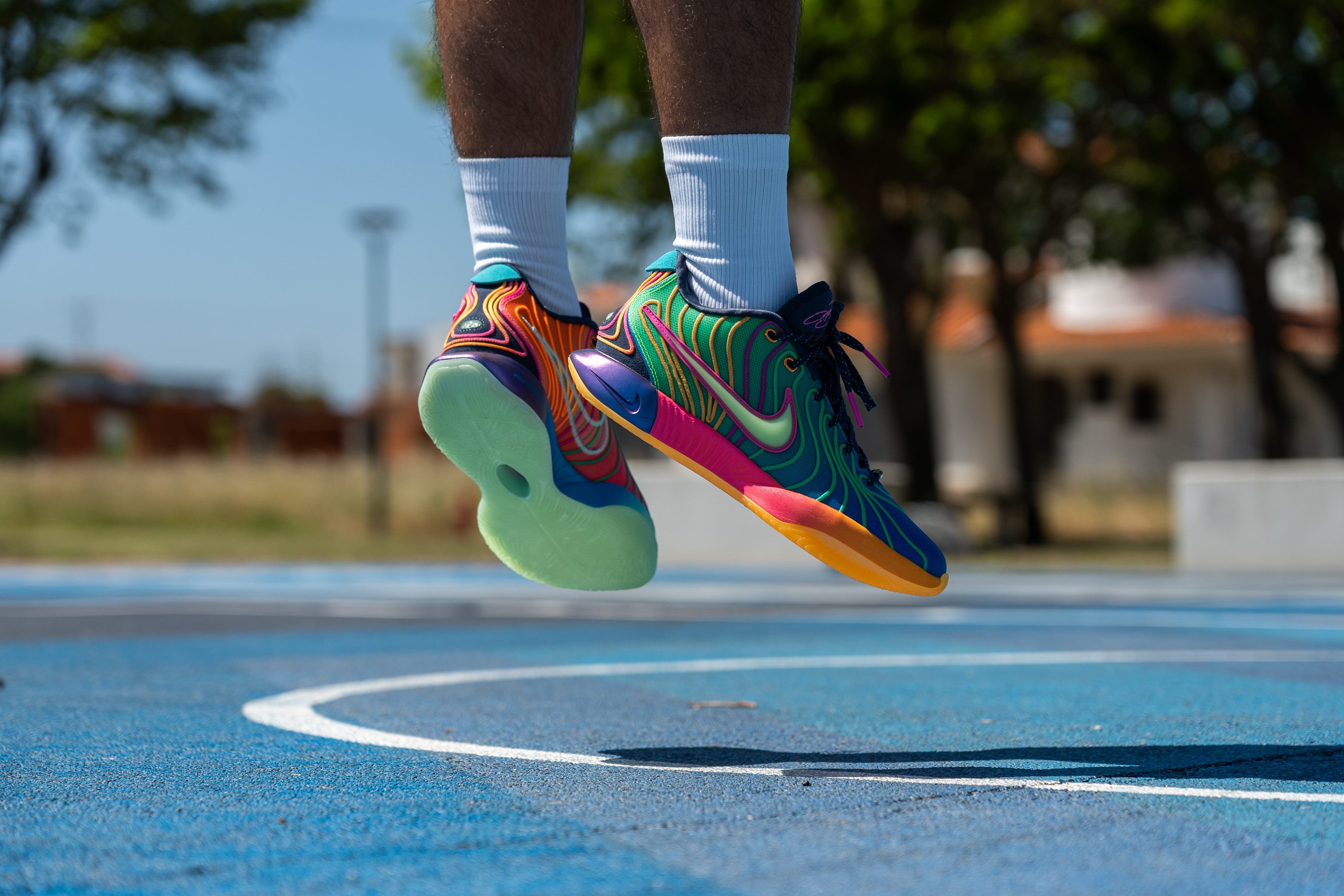
| LeBron 21 | 120.5 mm |
| Average | 114.8 mm |
Midsole width - heel
The heel was also a bit wider than average, but nothing too big this time.
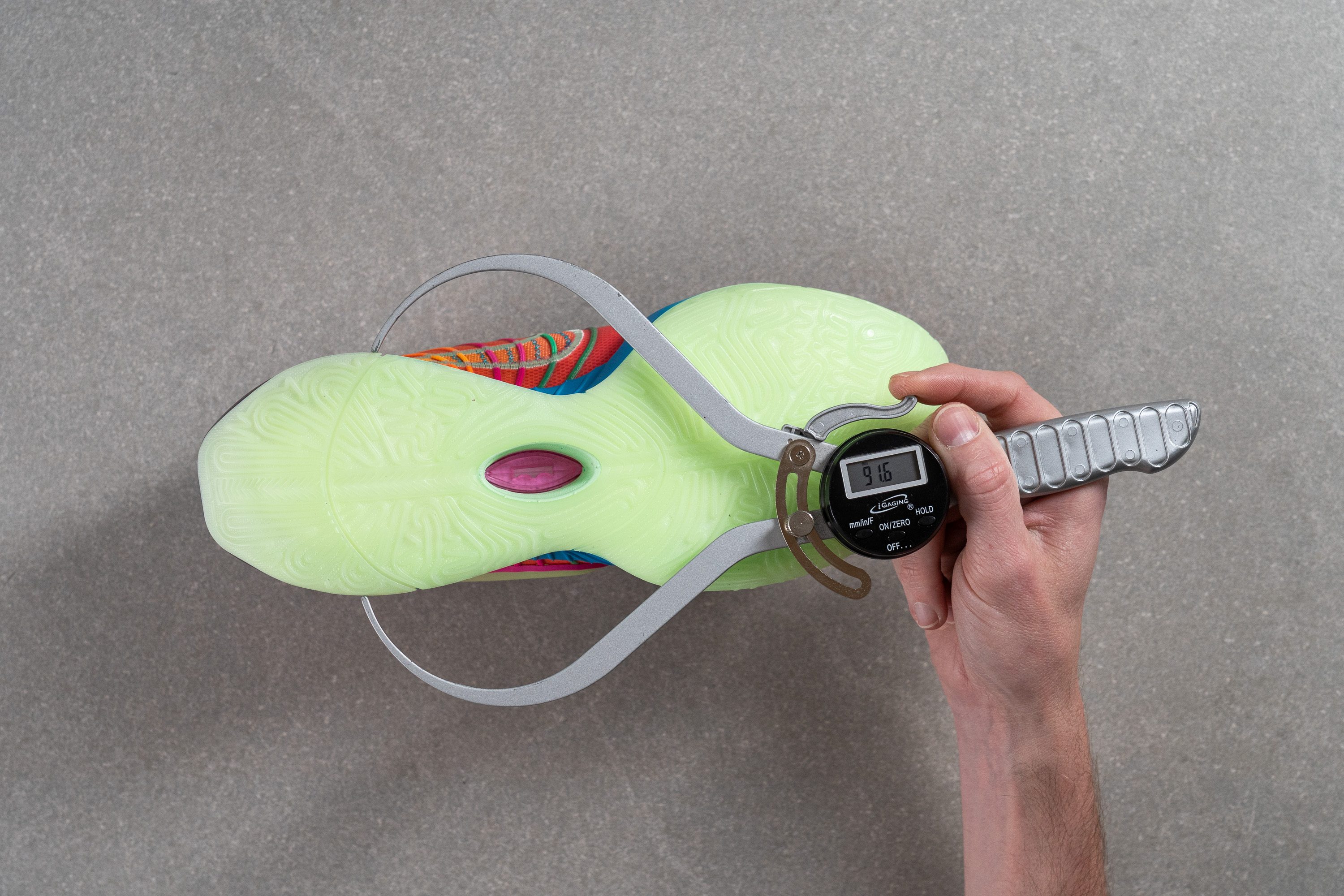
At 91.6 mm, this extra space is something we could only appreciate as the overall feeling in our heel was pretty snug. No heel slippage, no weird heel moves... nothing to worry about!
| LeBron 21 | 91.6 mm |
| Average | 89.7 mm |
Durability
Toebox durability
It doesn't really matter if you're a huge basketball fan, if you only watch the NBA from time to time, or if you don't care that much about this sport... we all know who LeBron James is.
This legendary hooper is well-known for his aggressive plays under the rim, so it's only natural that his shoes are ready to match his playstyle.
We knew it right after watching this video. Our Dremel struggled a lot to damage this shoe's upper minimally. The LeBron 21 resisted the attack calmly, and its striking defense earned it a 5/5 in our toebox durability test.
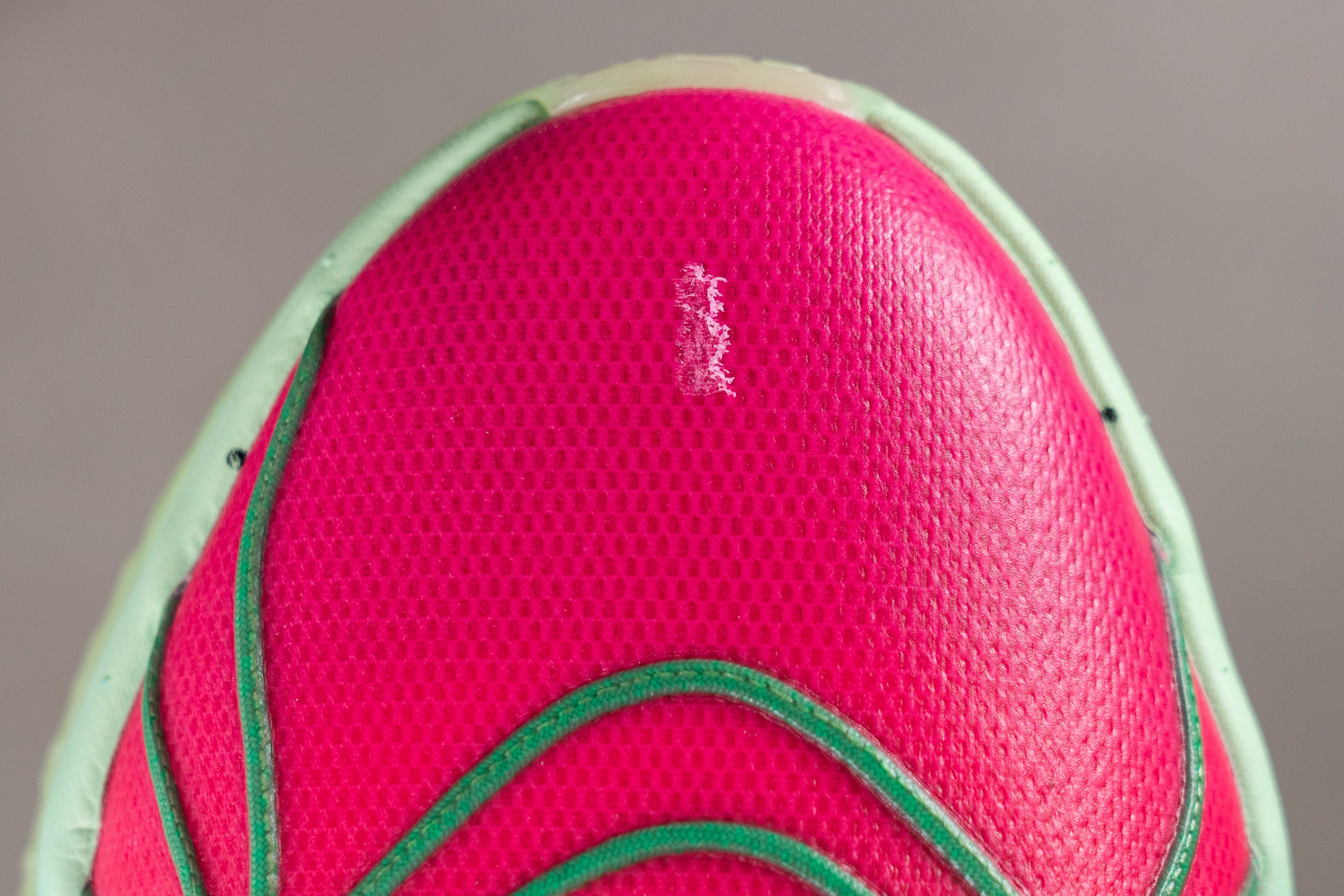
Look at that! It literally looks like we accidentally bumped our toes, not that a rolling tool at a 5K RPM speed and 3.2N pressure tried to destroy our shoe.
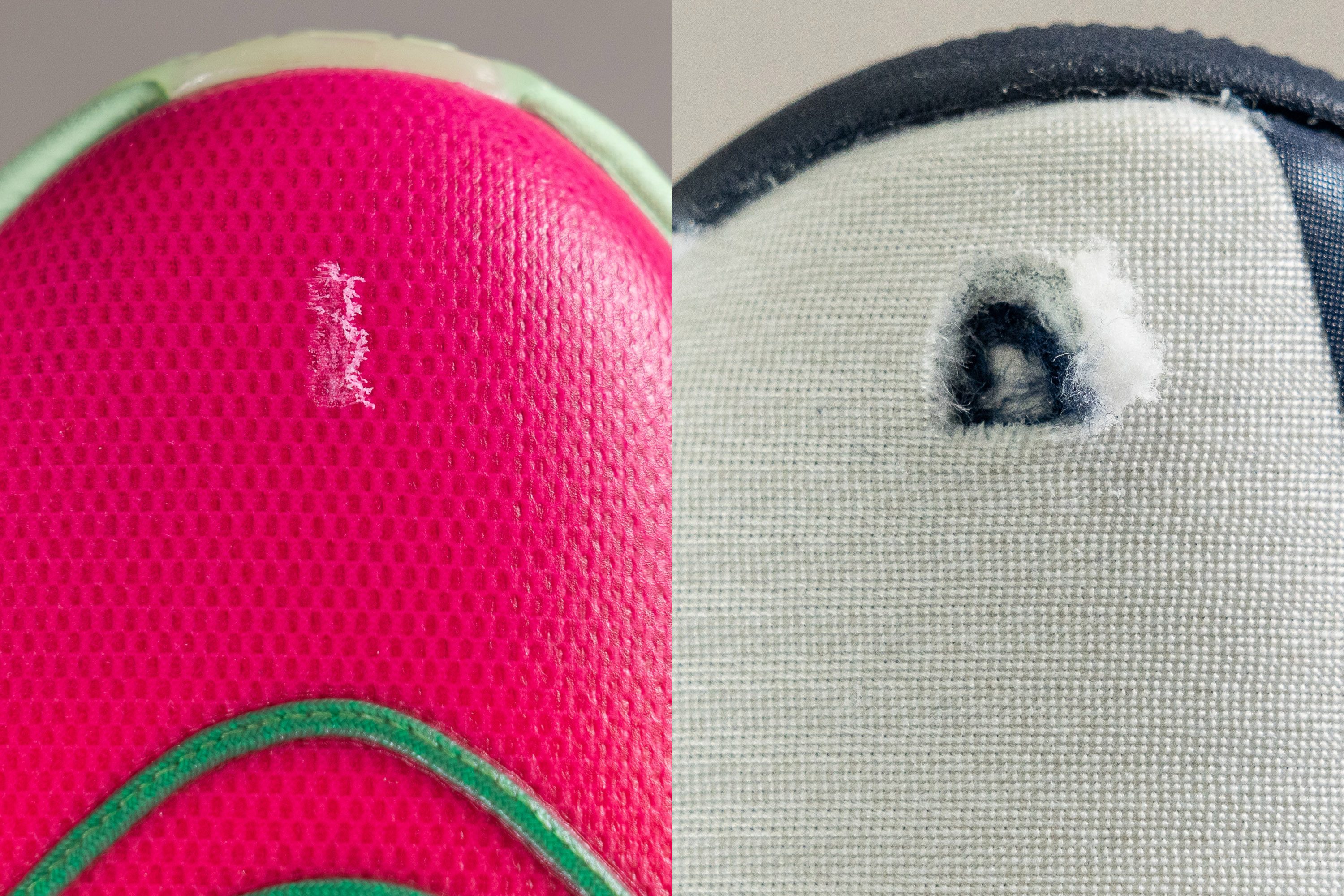
Here we have the two ends of the durability spectrum. On the left, the Nike LeBron 21 and its magnificent 5/5 in our toebox durability test. On the right, the Nike Precision 6 and its disappointing 1/5 in this same test.
| LeBron 21 | 5 |
| Average | 3.7 |
Heel padding durability
After the amazing durability of its toebox, we were wondering if the heel padding would be that much of a fighter too.
With an average score of 3/5, we actually couldn't complain. The heel is the weakest point of every shoe, so we're not that surprised when our Dremel damages it more than the toebox.
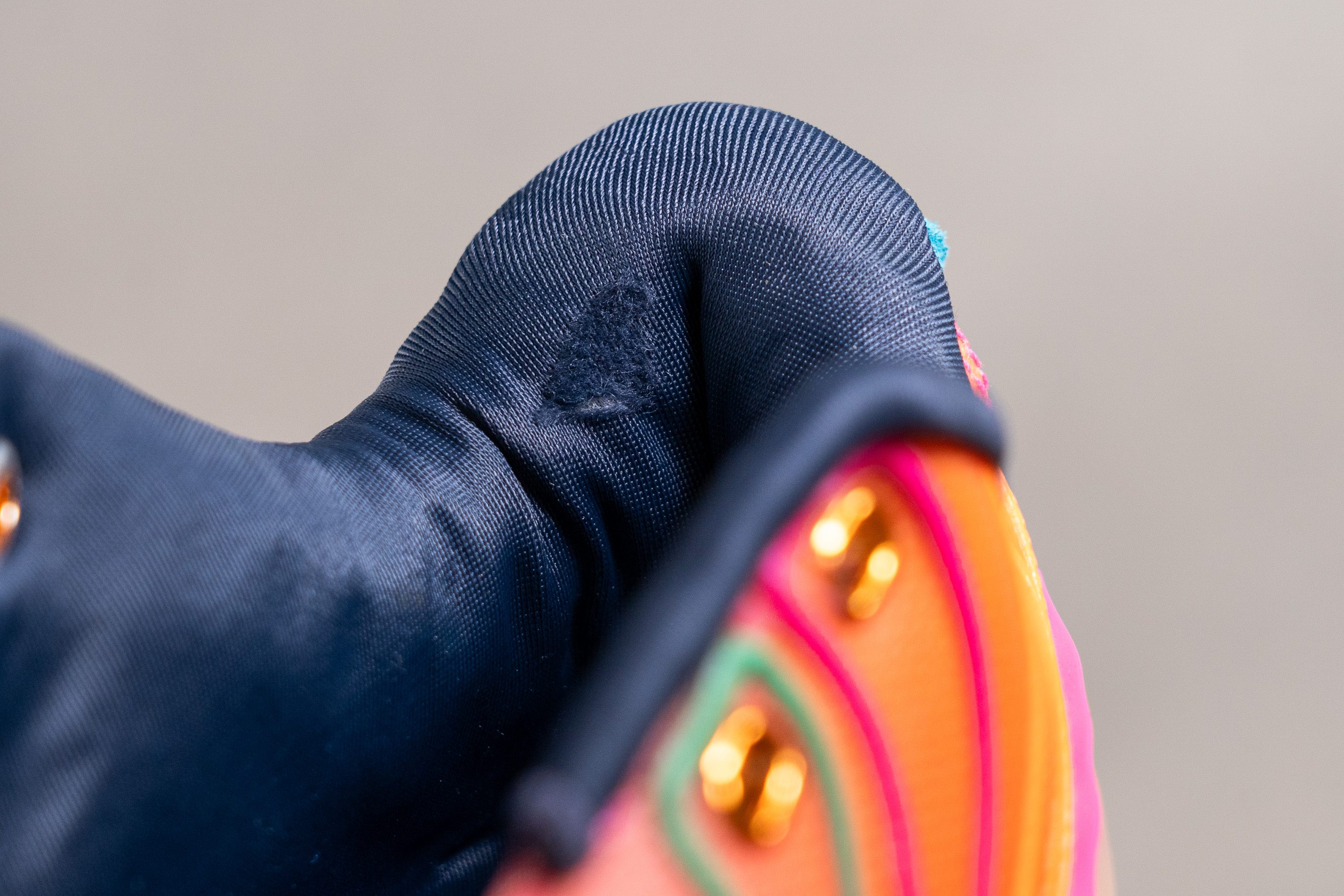
It didn't look that bad, though. Also, as you can probably guess from the image, there's a considerable amount of padding in that area. We decided to cut the shoe in half to see it better, look:
As we were saying before, we really can't complain! There are far worse results, let us give you an example.
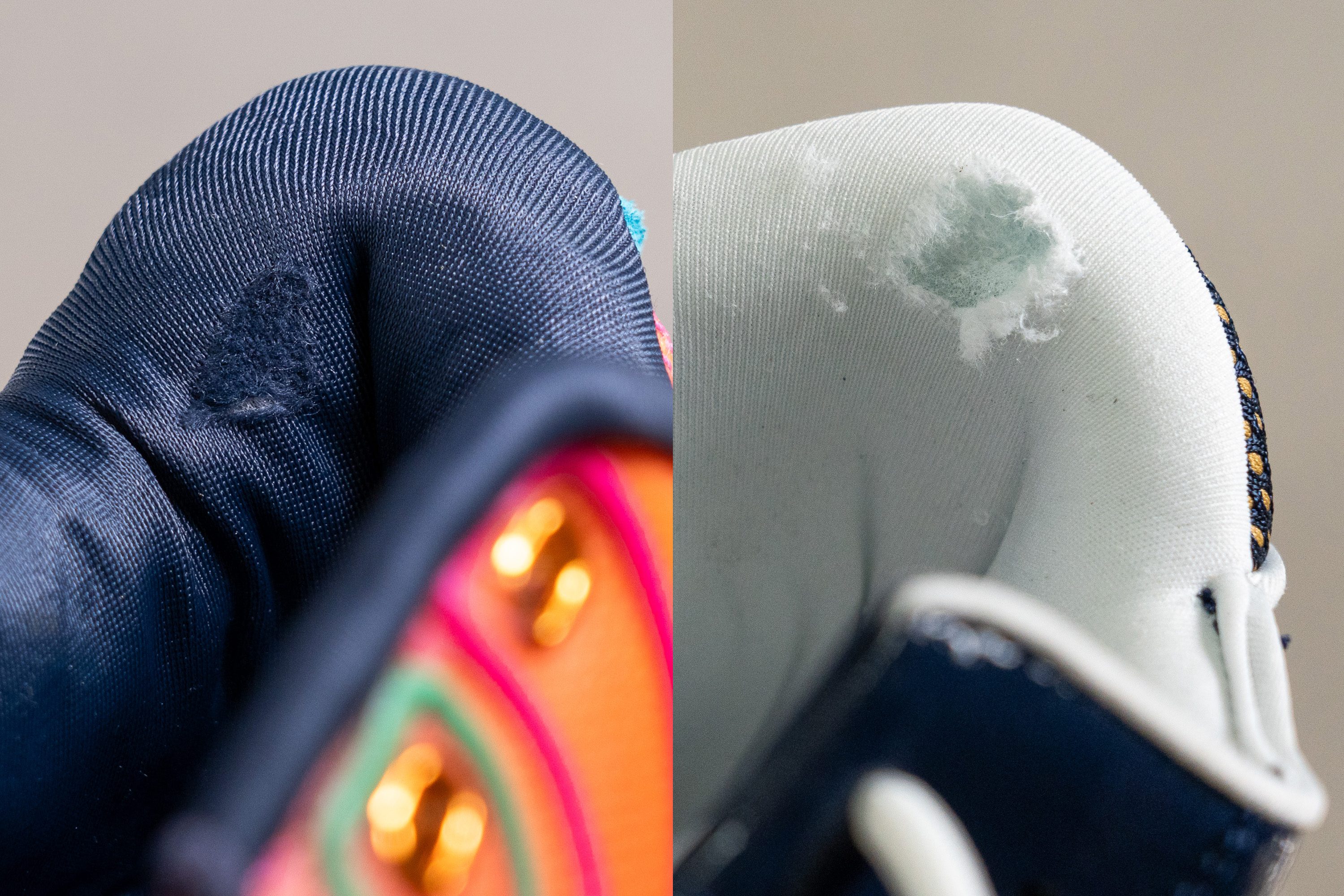
This is what the Reebok Answer DMX's heel looked like after our Dremel went all out on it. It scored a 1/5 in our heel padding durability test, we just couldn't give it anything higher!
| LeBron 21 | 3 |
| Average | 3.7 |
Outsole hardness
At 84.5 HC, the outsole hardness of this LeBron pair is slightly above average.
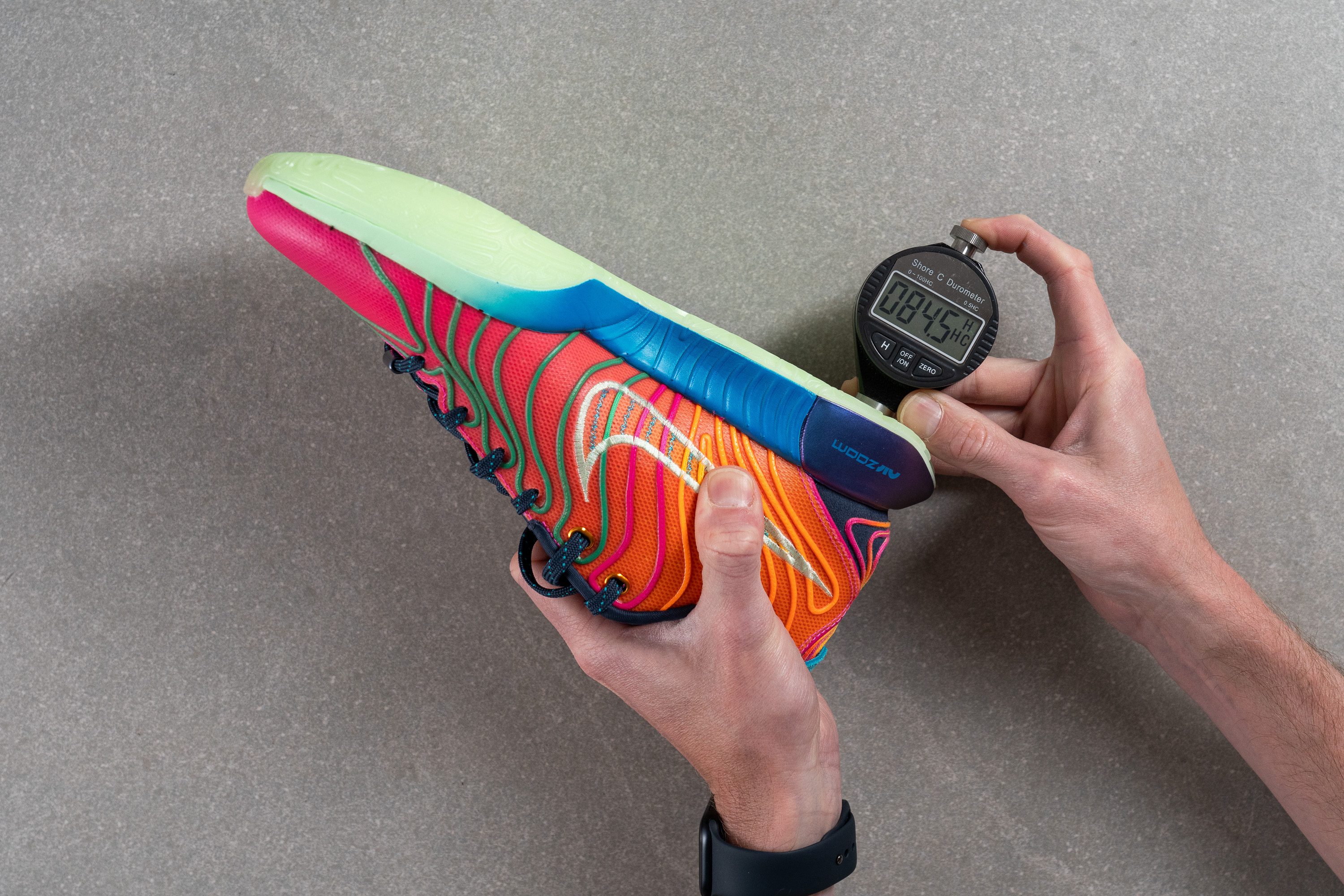
This result promises a good balance between grip and durability, and our wear tests couldn't agree more. Its traction felt quite reliable (we'll talk about it later on) and, regarding durability, all we can do is ask our Dremel!
| LeBron 21 | 84.5 HC |
| Average | 81.5 HC |
Outsole durability
For our outsole durability test, we grabbed our Dremel once again. This time at 10K RPM and 3.2N, the attack of our tool lasted 22 seconds.
If you only watch our video, you might think the Dremel wasn't even touching the outsole, as it's barely moving! This was already telling us that good things were coming... and we were absolutely right.
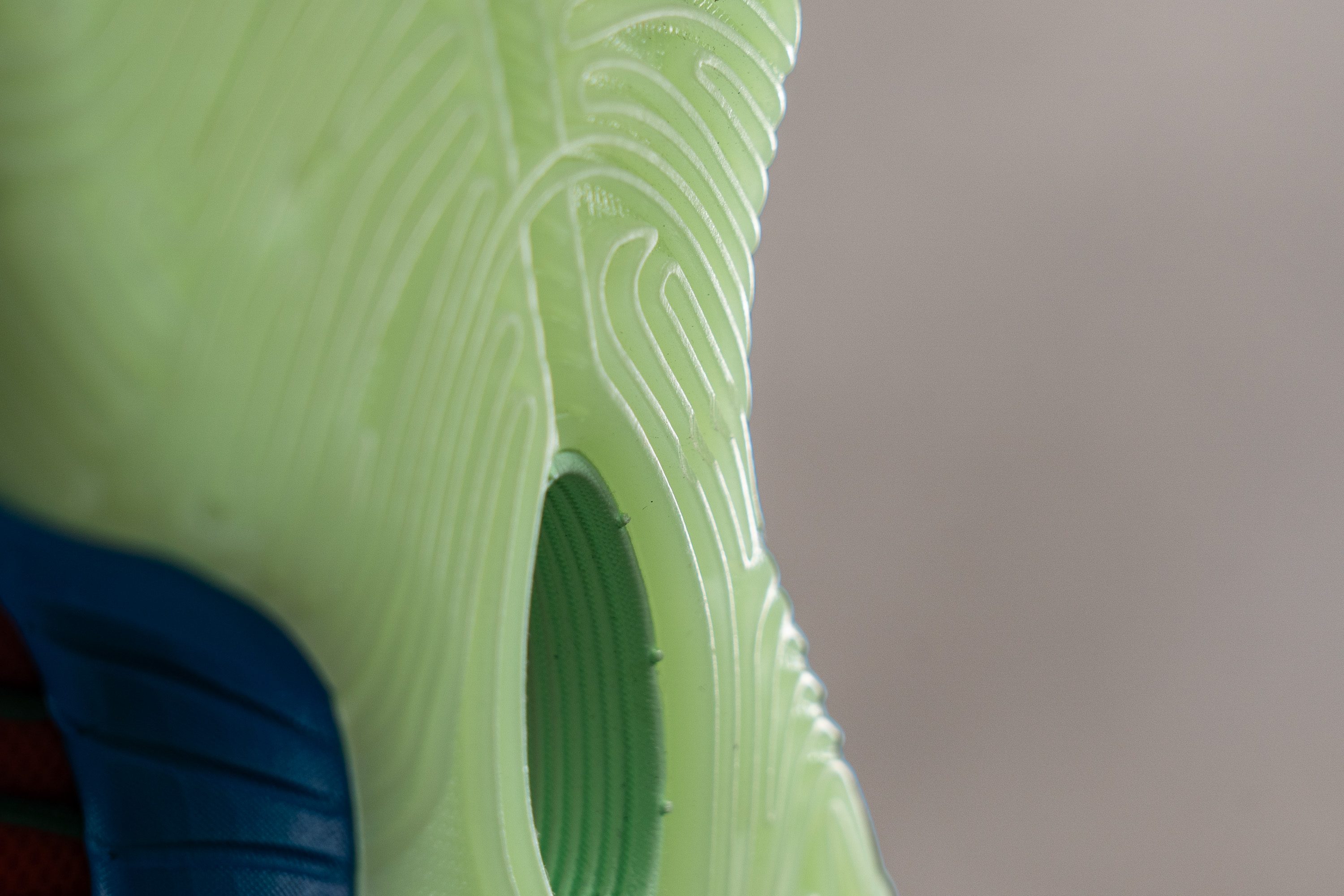
A minimal dent of 0.5 mm appeared when we finally put the tool aside. This is notably less deep than average, which clearly indicates the material is hard and resistant. We're loving it, Nike!
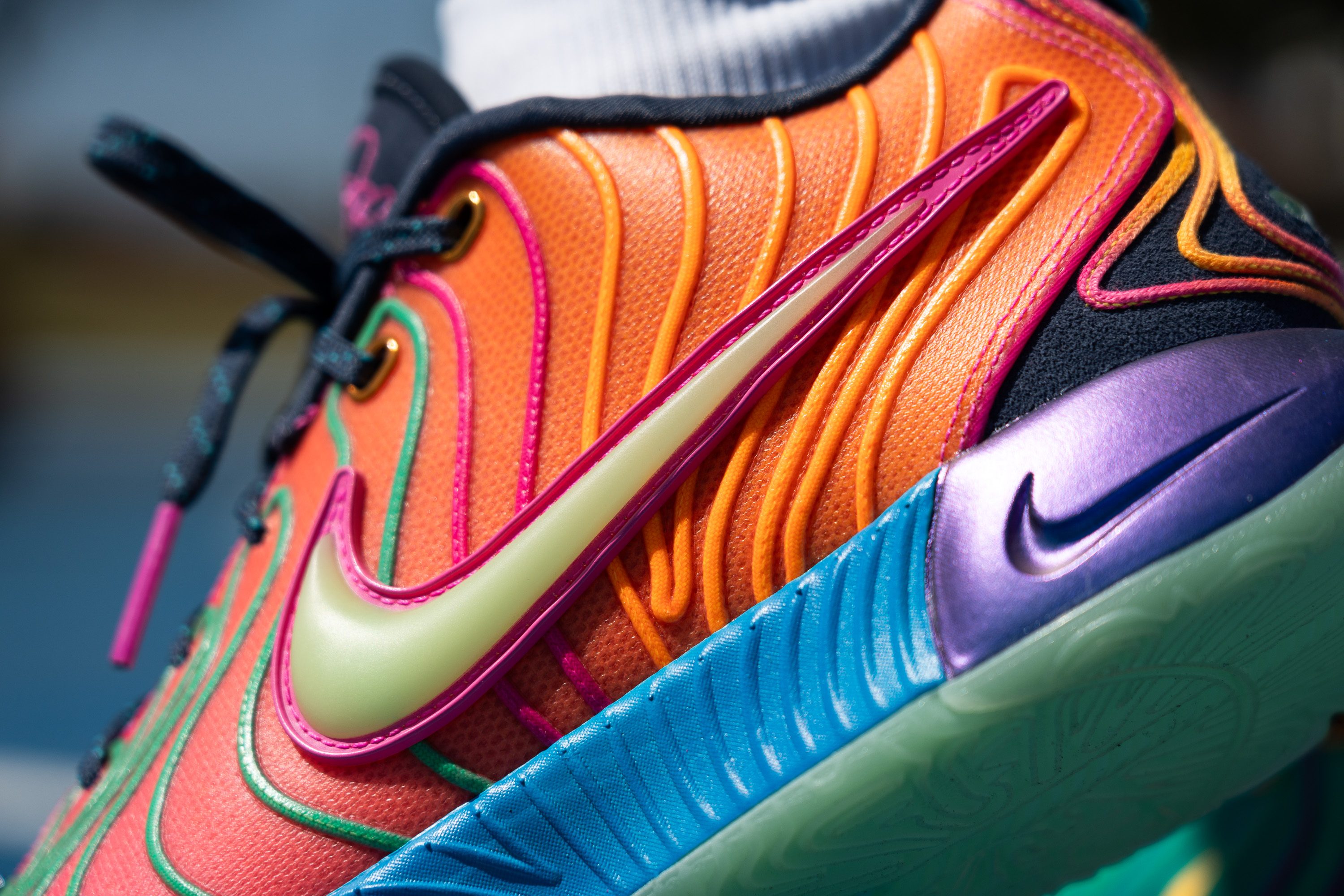
| LeBron 21 | 0.5 mm |
| Average | 1.0 mm |
Outsole thickness
As the outsole material is pretty hard, this part of the shoe doesn't need to be that thick.
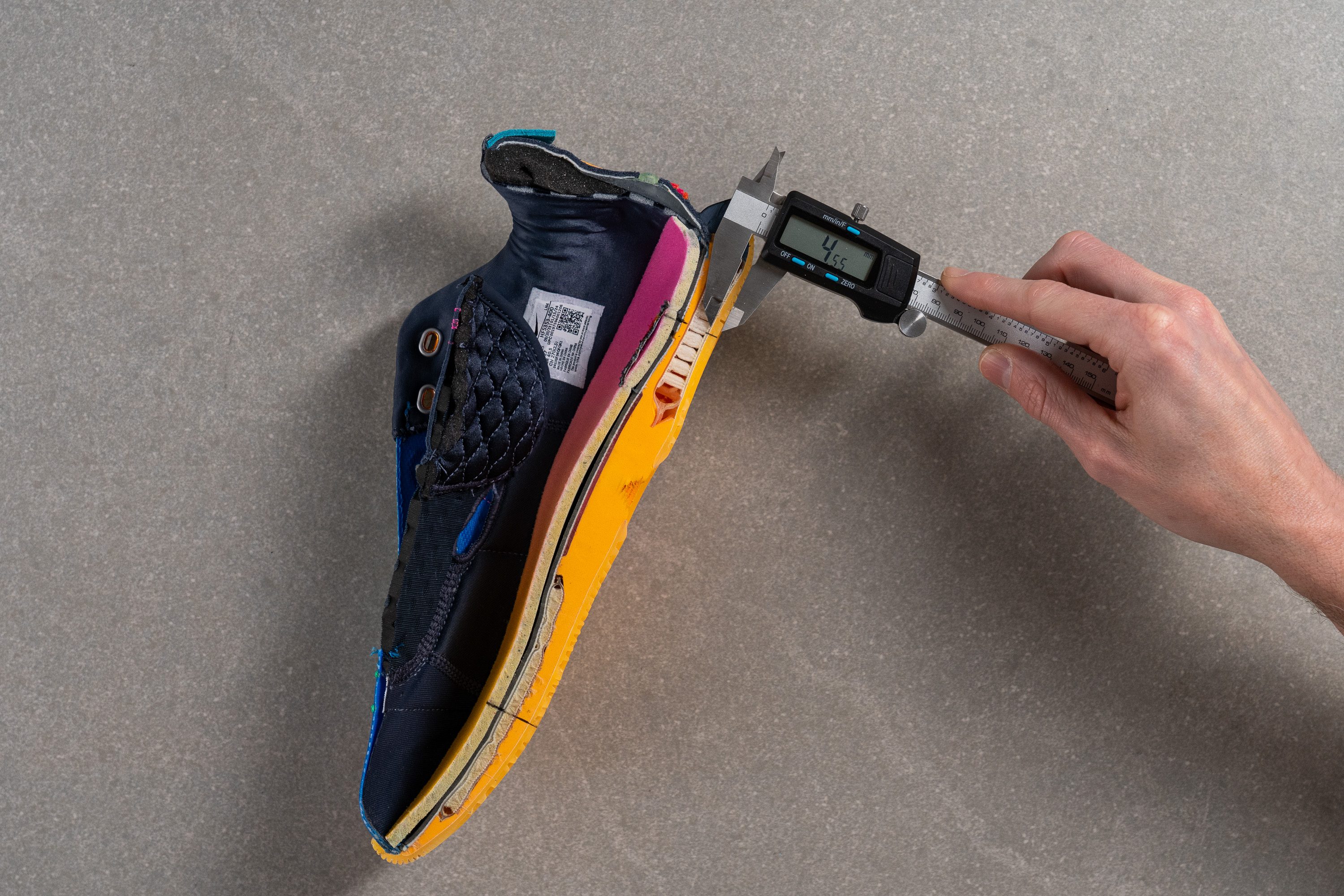
At 4.6 mm, our caliper indicated it's still thicker than average. This means the shoe's outsole won't lose its integrity any time soon. Time to hoop until you can no more!
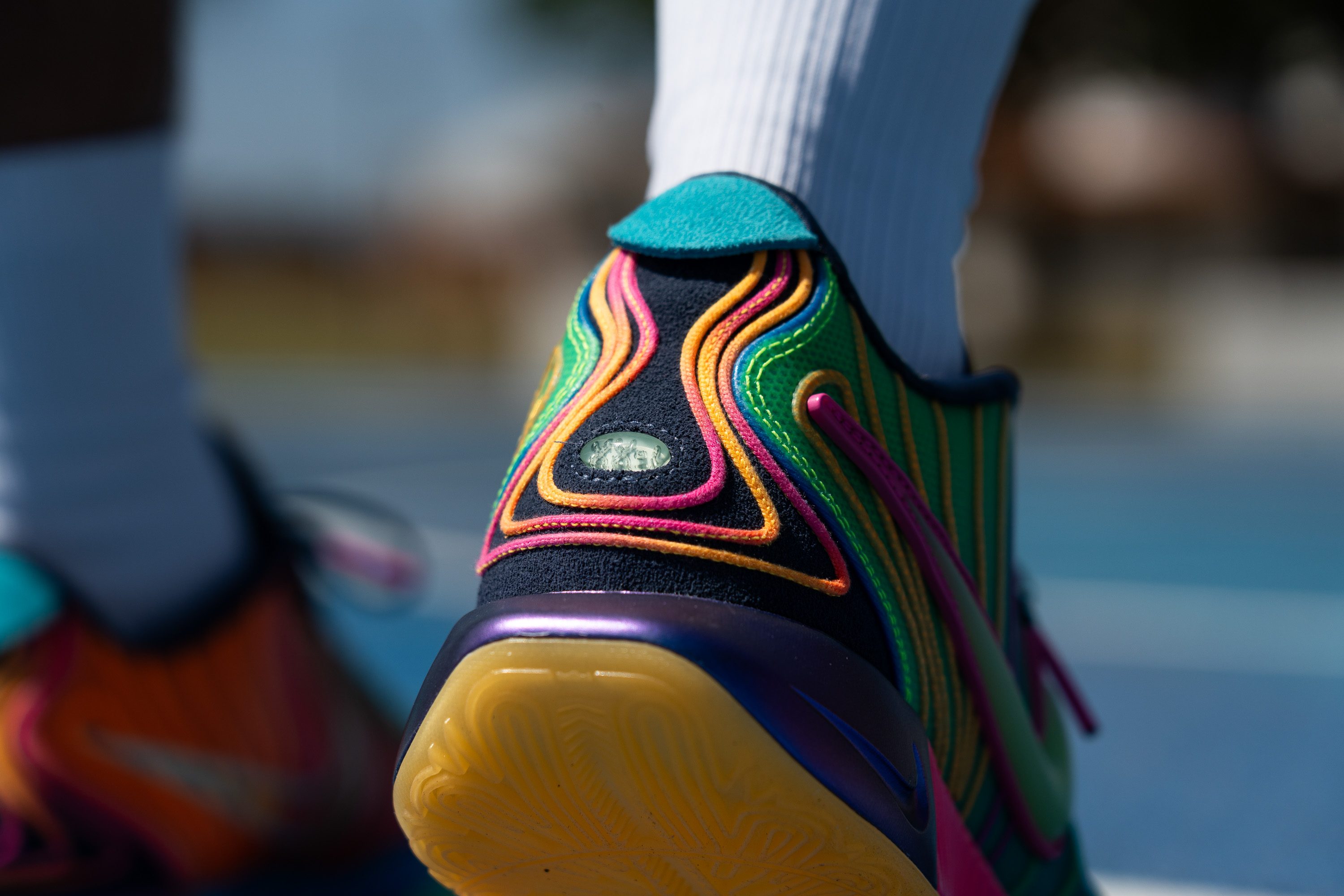
| LeBron 21 | 4.6 mm |
| Average | 4.0 mm |
Misc
Insole thickness
We do love us a nice and thick insole, and the LB 21 knows it well! At 5.7 mm, we felt it was comfortable during our playtests.
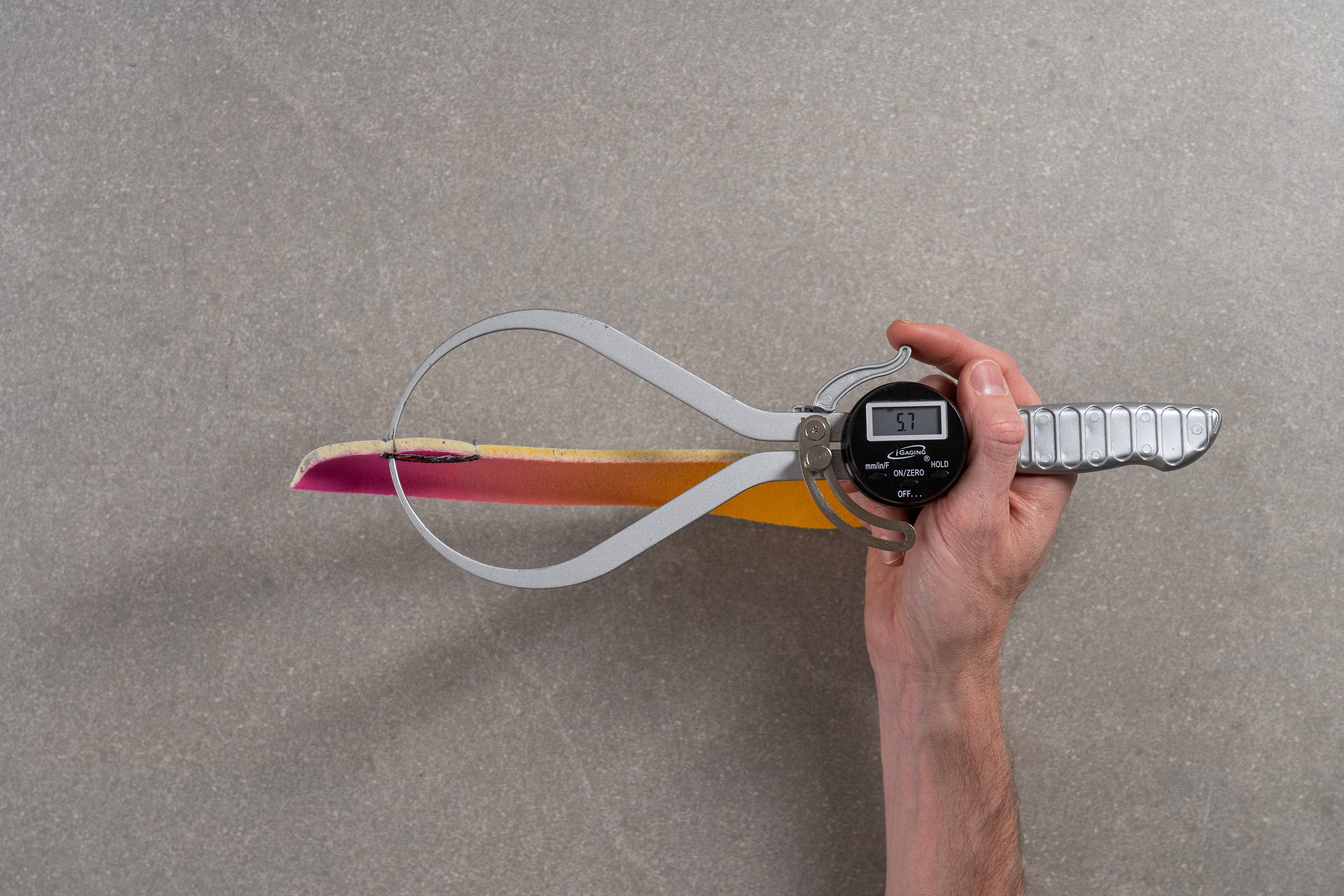
This thick insole + the Zoom Turbo at the forefoot + the Zoom Air at the heel = A fun and snappy ride. This combination made us enjoy every moment we had on the court, as we felt our energy was limitless thanks to the shoe's pop underfoot.
| LeBron 21 | 5.7 mm |
| Average | 4.9 mm |
Removable insole
Just in case you need to use your own orthotics, this LeBron pair has a removable insole.
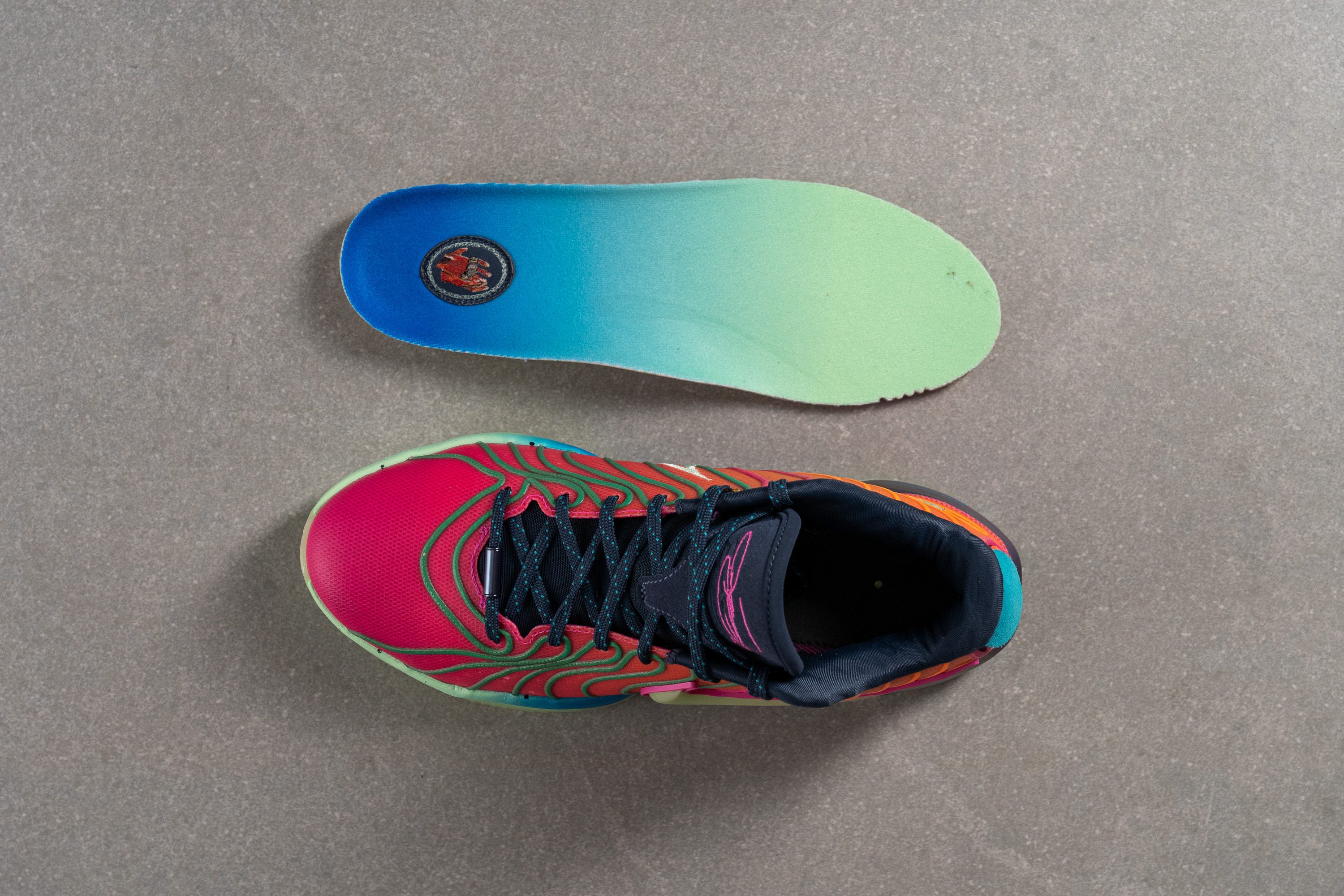
Honestly, we were pretty happy with how it performed during our playtests. But there'll be no problem if you want to change it, which is always a plus!
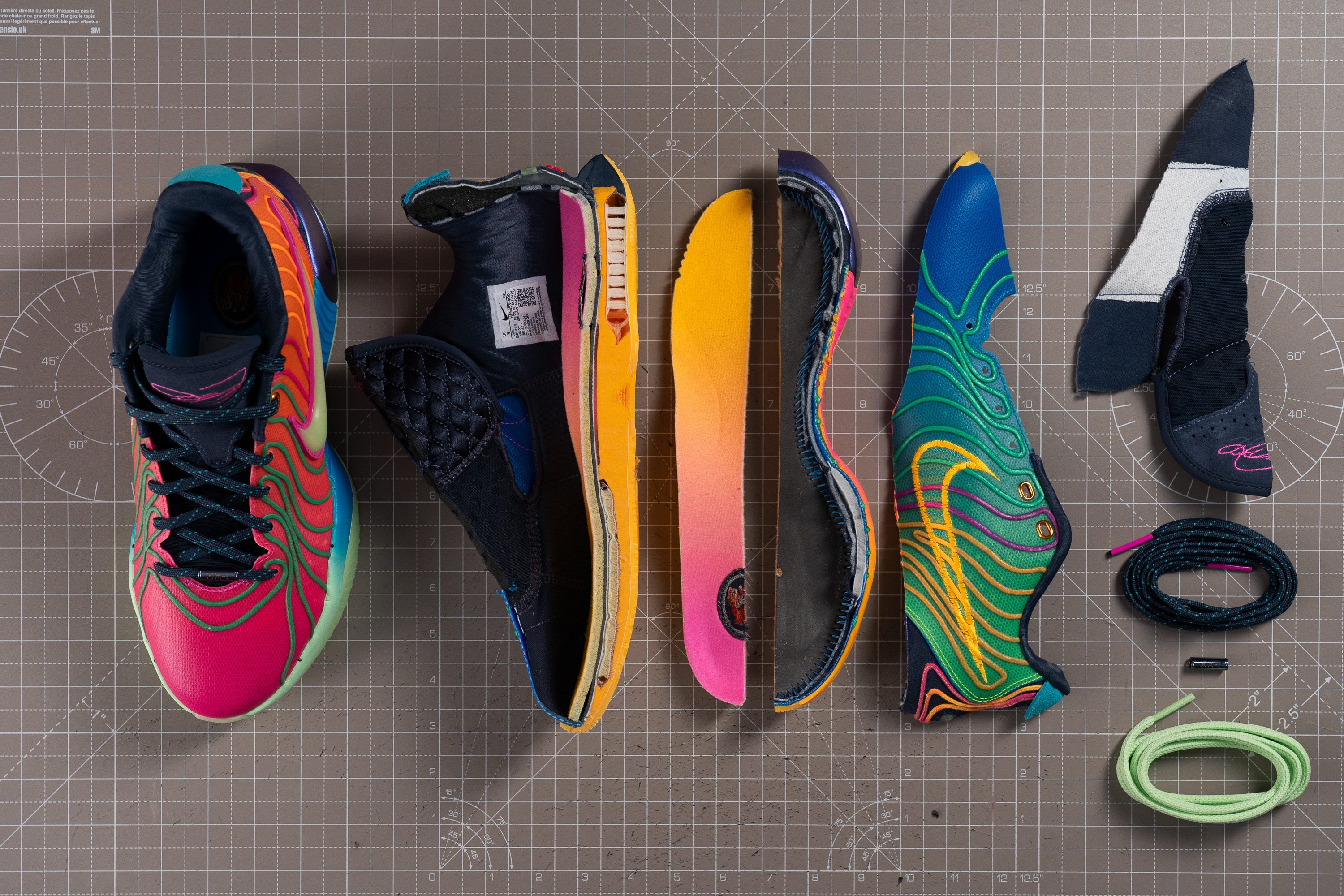
As you can see in these pictures, the insoles come in different colours, matching the aesthetic of each shoe. We are OBSESSED!
| LeBron 21 | Yes |
Reflective elements
We could see some fading light coming from the translucent Swoosh, but no, this shoe doesn't have any reflective elements.
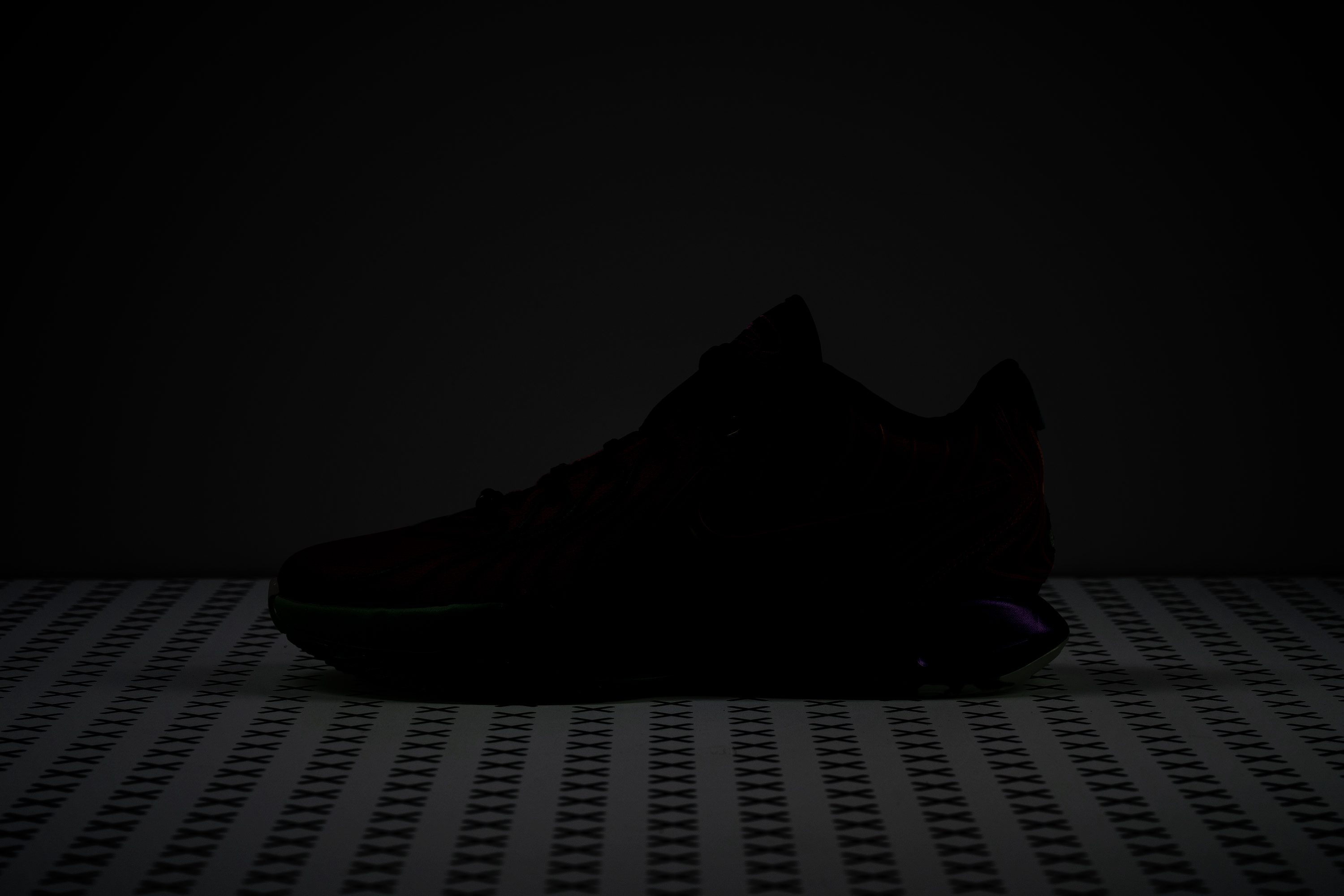
It's not made to play streetball after all, so we didn't mind it didn't have any despite it's hefty price tag.
| LeBron 21 | No |
Tongue padding
A thickly padded tongue is the final touch to the overall locked-in feel this shoe offered us.
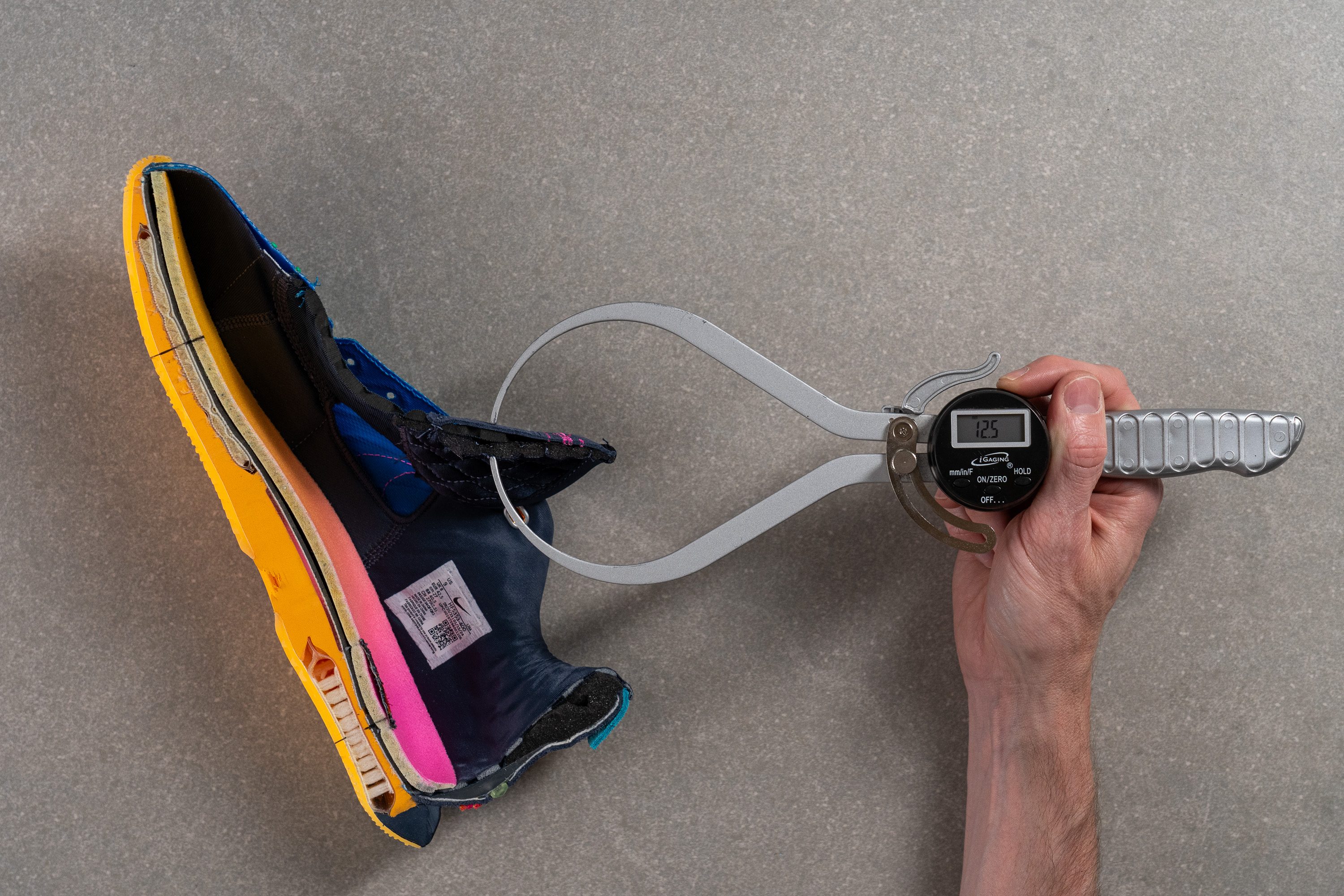
At 12.5 mm, our caliper confirmed that we wouldn't get any kind of bite or uncomfortable rub coming from the laces. Our instep was happily welcomed by a plush hug, and we loved it!
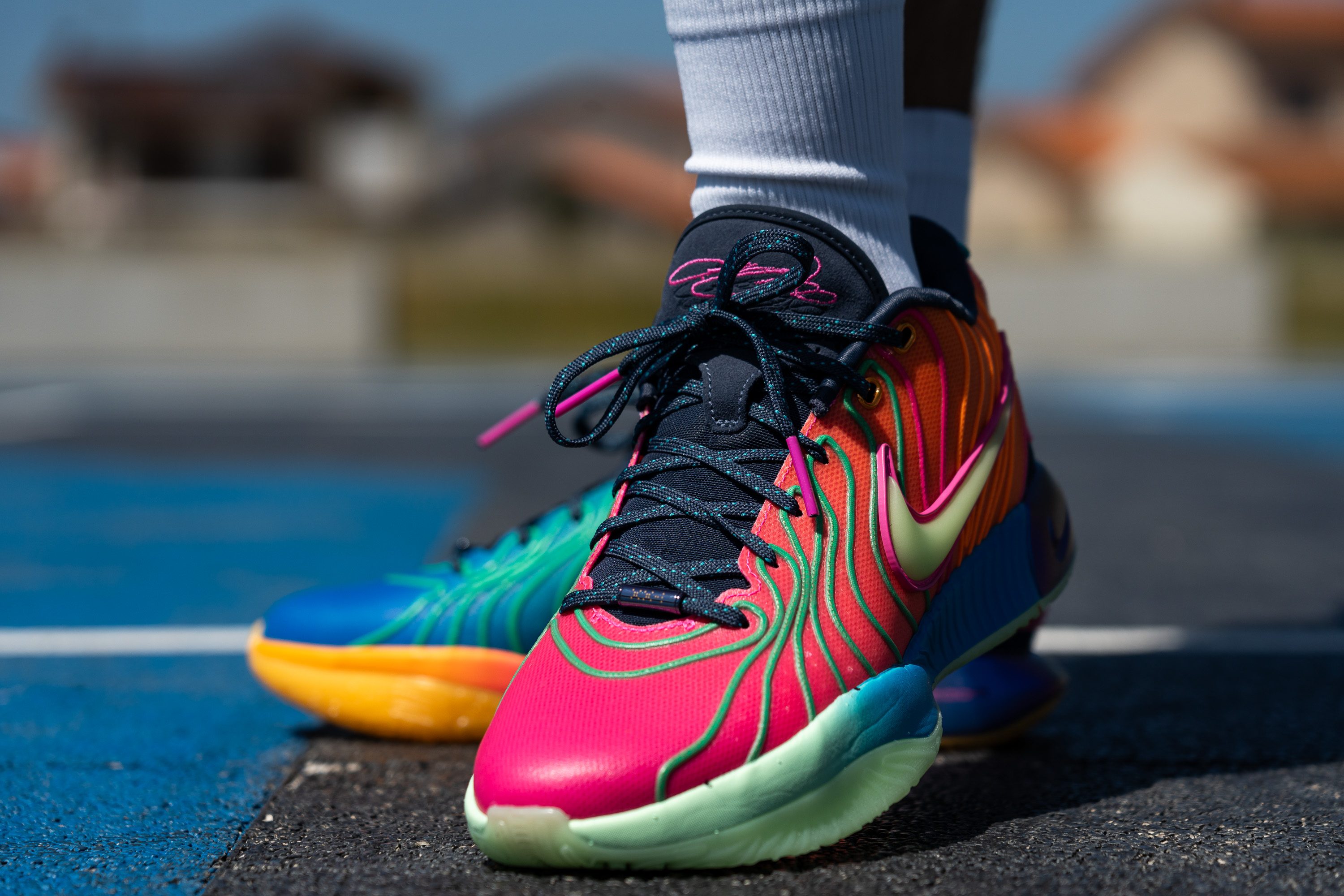
| LeBron 21 | 12.5 mm |
| Average | 9.3 mm |
Tongue: gusset type
We were pretty surprised when we removed this shoe's laces and faced its non-gusseted tongue.
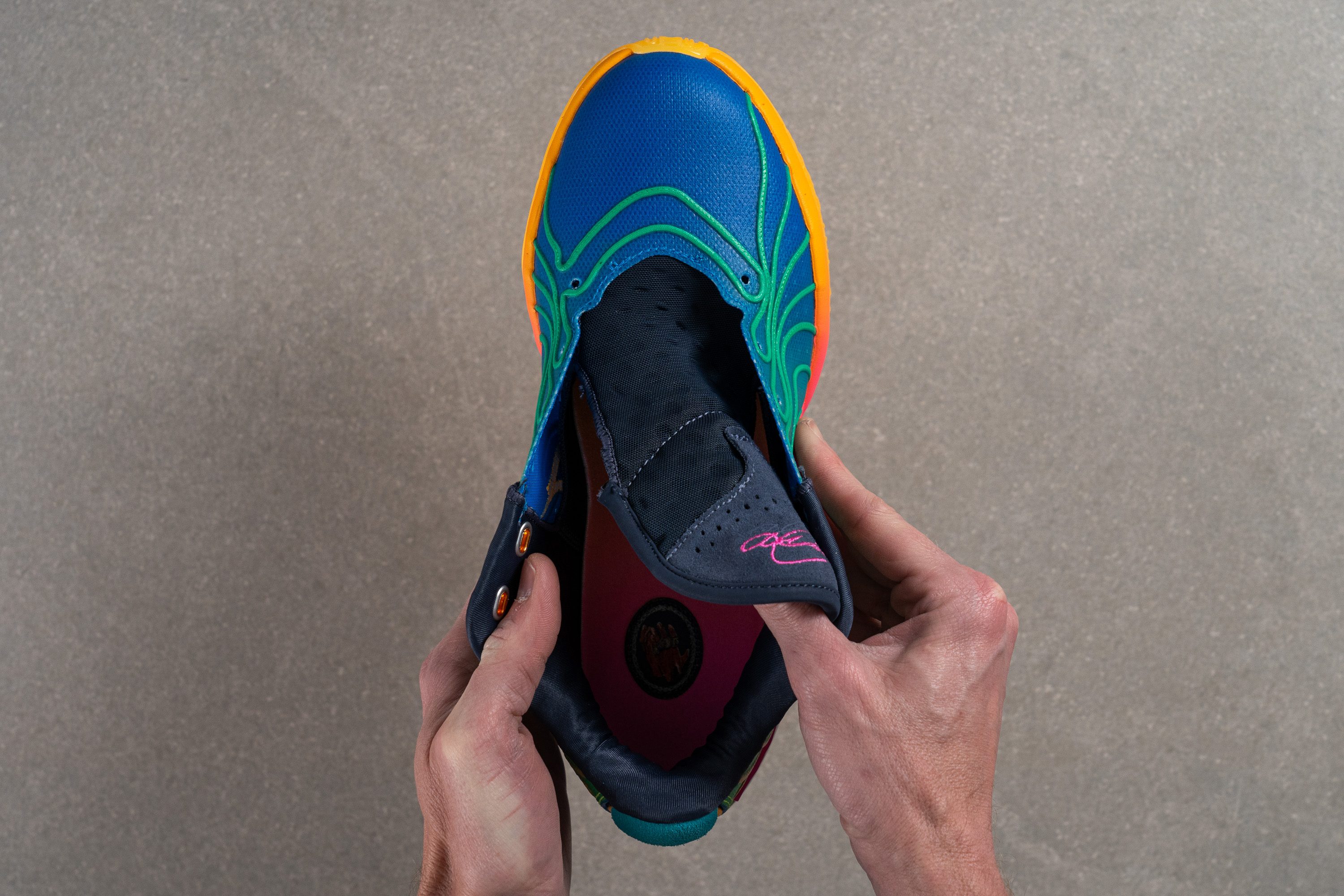
This design made sure our feet had no problem getting into the shoe. With its padded interiors, rigid and stable structure, and top eyelets, we didn't feel any less containment. There's also a lace in the middle of the tongue that makes sure it doesn't slip or dance from side to side, which is something we usually find pretty annoying!
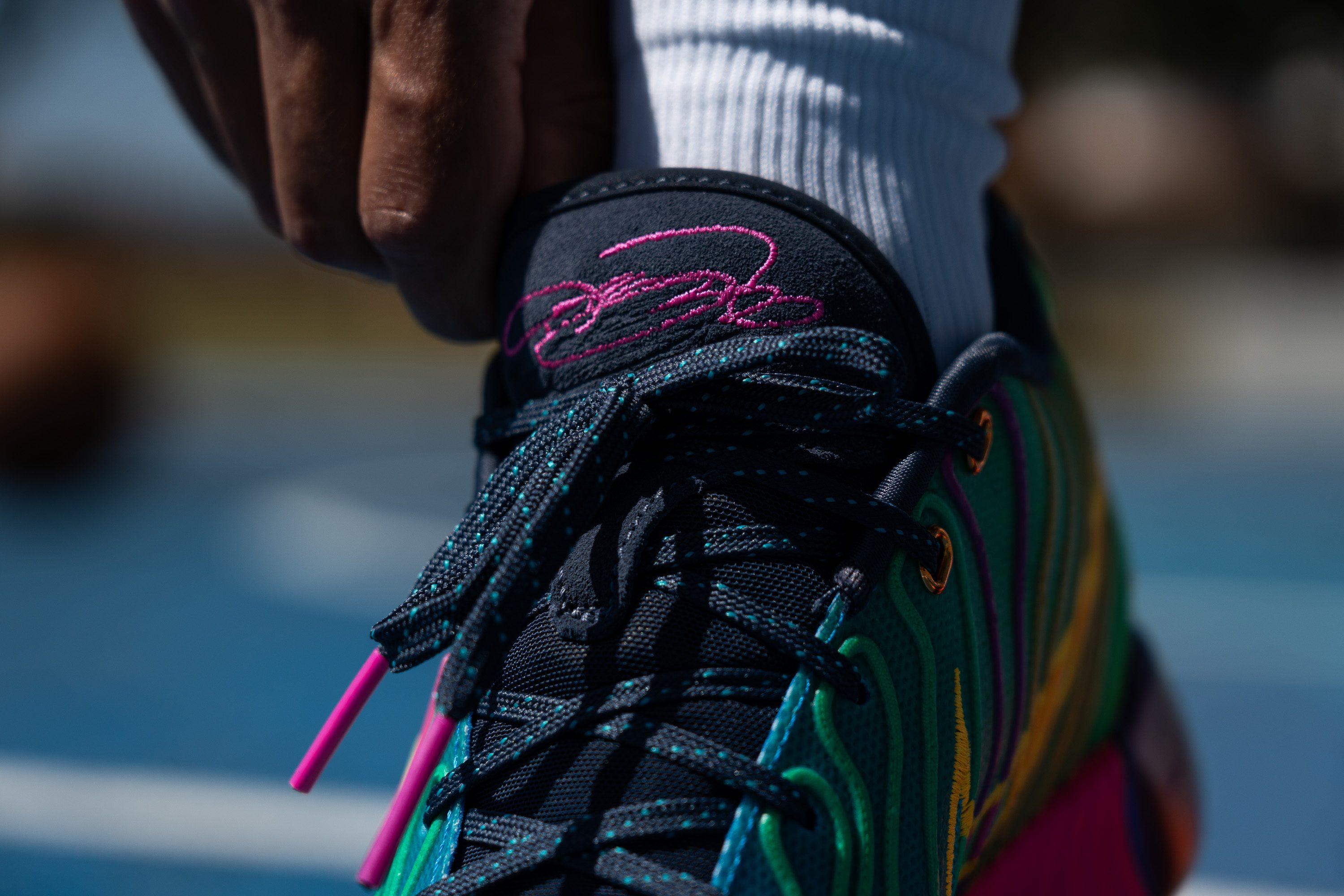
| LeBron 21 | None |
Heel tab
There's a colourful pull-tab at the back of this model. In this colorway, it's the blue-ish flap we can see at the top of the heel.
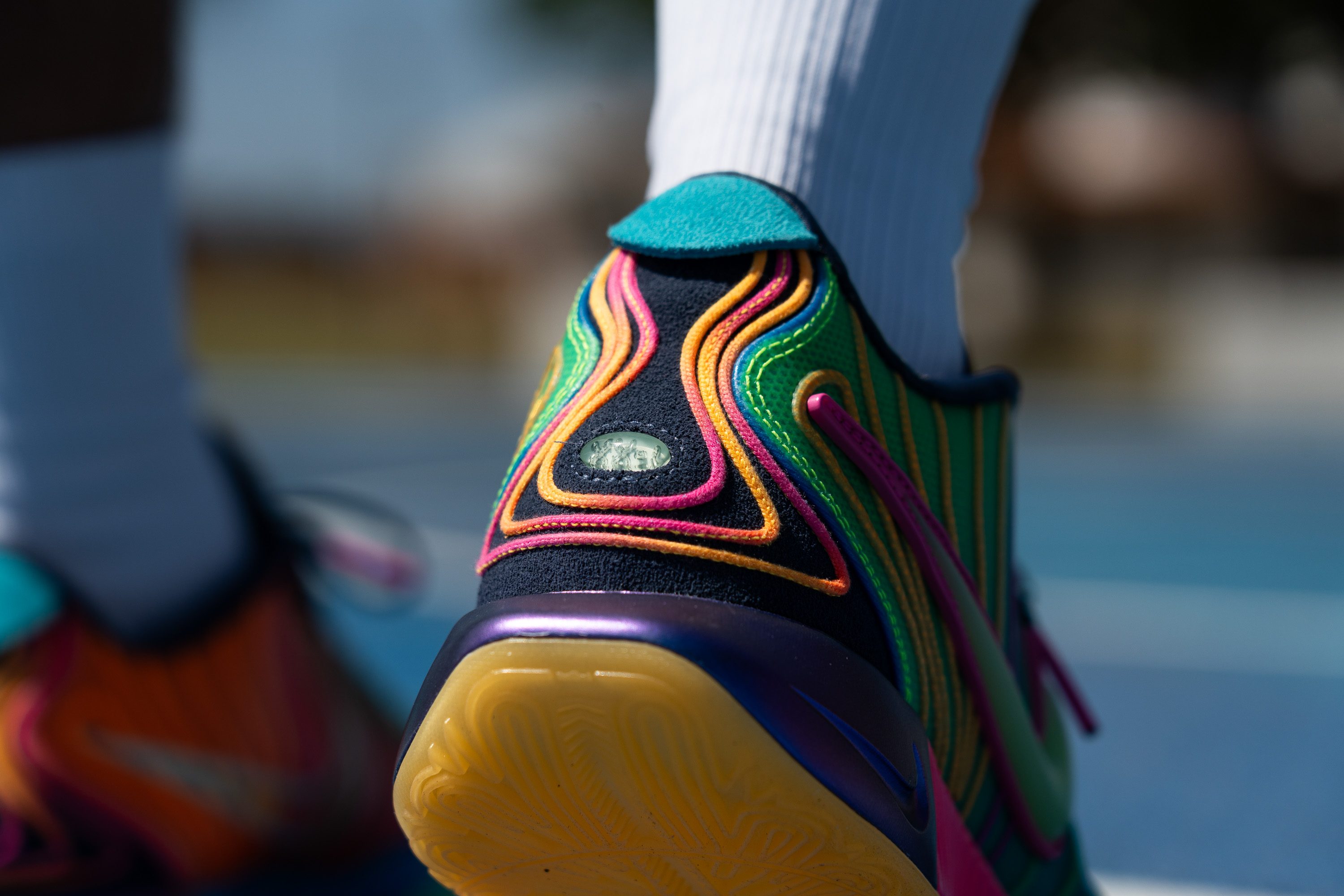
We didn't find it extremely helpful to put on and off the shoe, but we liked the design choice and the aesthetics. Also, let's not forget this pair has a non-gusseted tongue, so sliding our feet into it wasn't hard at all! The shoe offered us a wide and welcoming opening. Thank you, Nike!
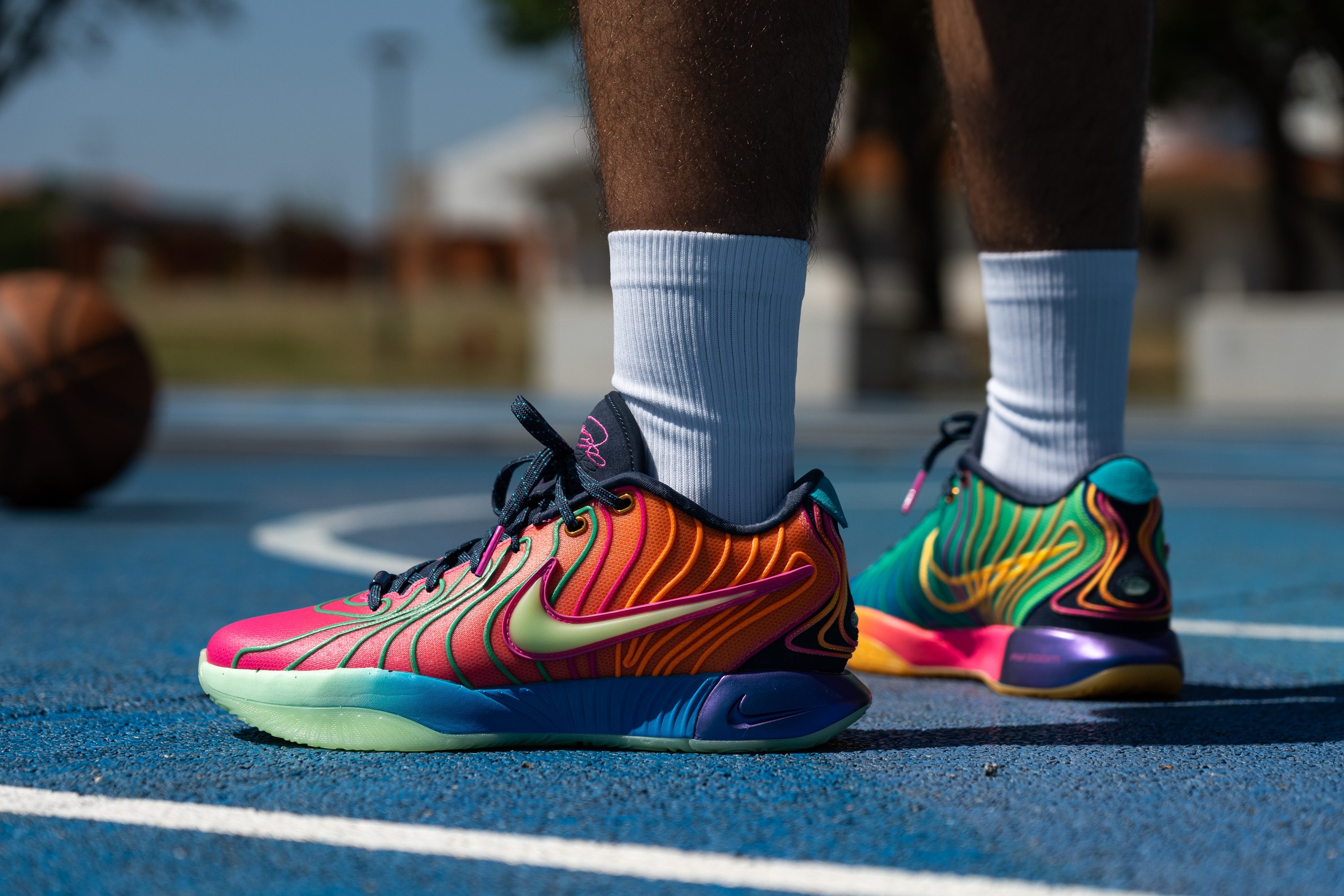
| LeBron 21 | Pull tab |

